







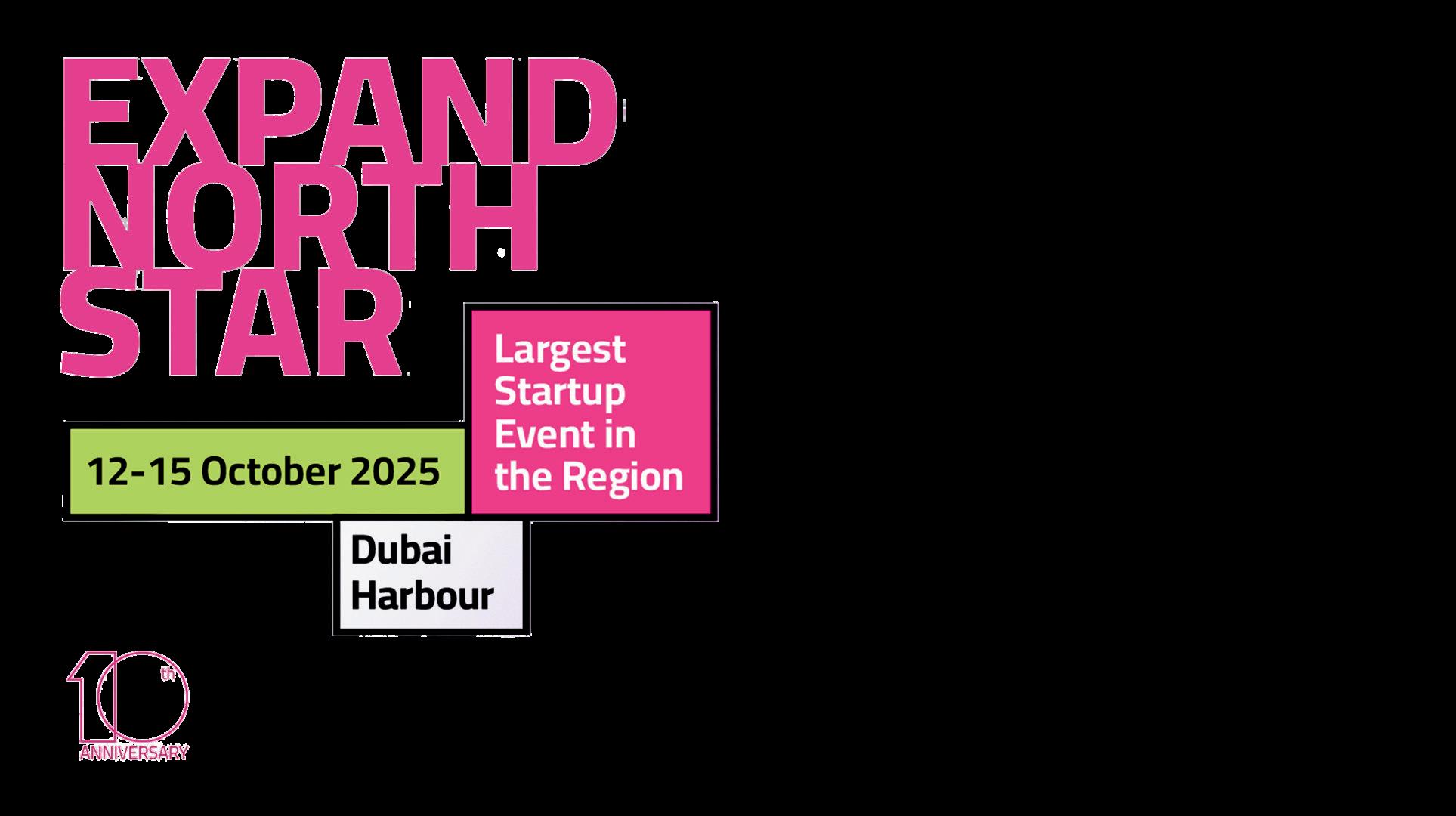














AI is everywhere. AI is the future.
Make no doubt about it, the AI revolution is here, and it is already transforming and reshaping almost every single industry vertical on a global scale.
I could write a book on the hyperbole that has been written about certain technologies over the last decade, only for it to eventually emerge as a fad, but this is different.
The US and China are locked in an economic arm-wrestle when it comes to AI.
Many of the ‘Big Tech’ players have reduced their headcount as a direct result of their investments in AI, with many analysts predicting that unlike previous industrial revolutions, this will be the first one to impact white collar jobs.
There is a lot to be figured out when it comes to AI, and nobody knows all the answers, it’s a fast-paced rugged juggernaut of a technology that continues to take on different form factors, and that makes it complex.
However, what we do know is that many organisations have got it wrong when it comes to AI, with many of those perhaps influenced at a boardroom level to quickly demonstrate their ROI with AI.
Others have looked at it bluntly from the point of saving costs, but whatever the approach adopted, few have got it right.
On the front cover of the combined June-July issue of CNME is James Fisher, Chief Strategy Officer at Qlik.
There is a lot to be figured out when it comes to AI, and nobody knows all the answers, it’s a fastpaced rugged juggernaut of a technology that continues to take on different form
Qlik is a company that is on a mission to help enterprises connect to and consolidate data from diverse sources, including databases, cloud services, and applications.
In a compelling interview, Fisher stresses the importance of ‘structured data’ –without that visibility on the data at your disposal then it is next to impossible to have the outcomes that you want when it comes to your AI investment.
You need to have a plan in place when it comes to AI.
Fisher also highlighted the need to address AI literacy across the Middle East region, he cited that over the last decade there was a lot of discussion in relation to data literacy, but now the focus is very much on AI.
Back at the beginning of May, which feels like a lifetime ago I was in Las Vegas for Knowledge25, which is hosted by ServiceNow.
ServiceNow has firmly established itself as the intelligent platform for digital transformation, and its reputation was solidified following the statement by NVIDIA CEO Jensen Huang, that ServiceNow is the AI operating system for the enterprise.
I spoke to Dave Wright, Chief Innovation Officer at ServiceNow, to talk all things AI.
A central theme in our conversation was that of Agentic AI, and the impact these AI agents are going to have on workforces in the future.
Wright said ServiceNow is viewing these agents as ‘assets’ and highlighted the unique capabilities of its AI Control Tower.
CNME also managed to secure an exclusive interview with serial tech entrepreneur Daniel Wagner.
Wagner is the Chairman and CEO of Rezolve AI.
A company that is using the power of conversational AI to transform customer experiences in digital commerce.
Wagner has an incredible CV and legacy in the IT and technology business, he created MAID in 1984, and took it public 10 years later, whilst he also created a company called Venda that was acquired by Oracle.
Since starting in January of this year, they generated $50bn in sales after just 3 months, and the company was listed on NASDAQ in April.
It is a fascinating read, with a man still as motivated to build something that is going to change the world, like he did with MAID back in 1984.
We have coverage from our GovTech Awards, roundtables with Bespin Global and Hitachi Vantara, and brilliant interviews with Cisco, MiCloud Software, Serenity, Two99, Yasmina and an op-ed from Zebra Technologies.
Enjoy the combined June-July issue of CNME.
Mark Forker Editor









CNME rounds up the biggest regional and global developments in enterprise technology, which includes the news that AWS has entered into a nuclear energy partnership to power datacenters, the US has decided to place restrictions on Huawei's AI manufacturing - whilst Meta has announced it will introduce ads to WhatsApp.
kausar.syed@cpimediagroup.com
10
18
22
32
36
Dave Wright, Chief Innovation Officer at ServiceNow, explains how their Agentic AI offering is going to power and transform the enterprise space.
Venket Naga, CEO of Serenity, outlines how fractional ownership is completely democratising the real estate sector across the UAE.
Daniel Wagner, Chairman and CEO of Rezolve AI, details how they are leveraging the power of conversational AI to completely transform CX in digital commerce.
Rami Abu Arja, Senior Innovation Manager at Yasmina, on the impact their AI-powered bilingual product is having on the smart home space.
Fady Younes, Managing Director for Cybersecurity at Cisco Middle East, has doubled down on their commitment to addressing the skills gap that exists within the cybersecurity industry.




The White House recently directed the Defence Department and NASA to gather details on billions of dollars in SpaceX contracts following the public blowout between President Donald Trump and billionaire Elon Musk. Sparking an ongoing review, the administration ordered a scrutinisation of Musk’s contracts to ready possible retaliation against the businessman and his companies.
The people familiar with the order said the contract scrutiny is intended to give the administration the ability to move fast if Trump decides to act against Musk, who until recently was a senior advisor to the president and the head of the cost-cutting Department of Government Efficiency, or DOGE.
“There’s an irony here that Musk’s contracts could be under the same type of subjective political scrutiny that he and his DOGE team have put on thousands of other contracts”, said Scott Amey, a contracting expert and general counsel at the Project on Government Oversight, a watchdog group based in Washington. “Any decision shouldn’t be based on the egos of two men but on the best interests of the public and national security”.


U.S. utility Talen Energy announced recently that it had entered an expanded nuclear energy partnership with Amazon. com to supply energy to Amazon Web Services (AWS) data centres. The longterm deal, lasting until 2042, ensures Talen a stable revenue stream while supporting Amazon's demand for carbon-free energy to power its AI and cloud operations.
Both companies will also explore building new Small Modular Reactors
within Talen's Pennsylvania footprint and pursue expanding the nuclear plant's energy output.
"We are making the largest private sector investment in state history – $20 billion– to bring 1,250 high-skilled jobs and economic benefits to the state, while also collaborating with Talen Energy to help power our infrastructure with carbon-free energy", Kevin Miller, AWS Vice President of Global Data Centres, said.
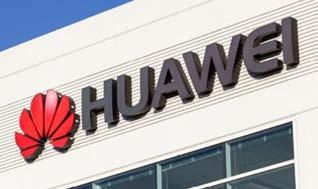
Chinese technology company Huawei is restricted to developing no more than 200,000 advanced AI chips in 2025, according to U.S. exports controls official. Though the number is below the company's demand, there is still concerns within the U.S. that China is quickly catching up to their capabilities.
Since 2019, a slew of U.S. export rules aimed at curbing China's technological and military advancements have limited access by Huawei and other Chinese firms to high-end U.S. chips and the equipment needed to produce them. The issue has become a flashpoint in U.S.-China relations.
Facing those restrictions, Huawei aims to ship its Ascend 910C AI chips to Chinese customers as an alternative to those made by the United States' Nvidia, the global leader.
"Our assessment is that Huawei Ascend chip production capacity for 2025 will be at or below 200,000 and we project that most or all of that will be delivered to companies within China", Jeffrey Kessler, Under Secretary of Commerce for Industry and Security at the Commerce Department, told a congressional hearing.
Kessler said that the U.S. should not take comfort in the figure.
"China is investing huge amounts to increase its AI chip production, as well as the capabilities of the chips that it produces. So, it's critical for us not to have a false sense of security, to understand that China is catching up quickly", he told the House of Representatives Foreign Affairs South and Central Asia subcommittee.
The Trump Organisation has recently launched a self-branded mobile service and a $499 smartphone, dubbed Trump Mobile. Marketed towards conservative consumer, the Organisation is keen to position this wireless service as an alternative to major telecom providers. The new mobile venture will include call centres based in the United States and phones made in America.
The Trump Organisation, which is the main holding entity for most of the U.S. president's business ventures, said ahead of Trump's inauguration that control of the company would be handed to his children, replicating the arrangement from his first term, though concerns about potential conflicts of interest remain and were expressed by a several commentators.
"I don't see much impact from Trump mobile across the industry, as half

of it's addressable market is negated by political parties, and then from there, this industry already has a lot of stickiness to current providers. These companies need scale to work, and we'll see if the company can execute on the most important thing - consistency of network", said David Wagner, Head of Equities, Aptus Capital Advisors, Cincinnati, Ohio.

Three of the world's top providers of bitcoin mining machines - all Chinese based - are - are setting up manufacturing footholds in the United States as President Donald Trump's tariffs reshape the cryptocurrency supply chain.
Bitmain, Canaan and MicroBT build over 90% of global mining rigs - essentially computers dedicated to number-crunching that produces bitcoin. Establishing U.S. bases could
shield them from tariffs but risks stoking security concerns the U.S. has with China in areas as varied as chip making and energy security.
"The U.S.-China trade war is triggering structural, not superficial, changes in bitcoin's supply chains," said Guang Yang, chief technology officer at crypto tech provider Conflux Network. Moreover, for U.S. firms, "this goes beyond tariffs. It's a strategic pivot toward 'politically acceptable' hardware sources," Yang said.
Adobe Inc. recently released its first dedicated AI smartphone app that includes AI models from the company and will feature partner firms in the future. This is understood to be part of a strategy to tap into a growing trend of sharing AI images and videos over social media.
The new Firefly mobile app packages Adobe’s own AI model together with models from OpenAI and Google and is available on iOS and Android phones. Adobe's mobile service will offer subscribers unlimited basic image generation from Adobe models, while it will charge extra for access to the company's premium models and those from its partners. The subscription cost will be the same as for the web versions of Firefly, which start at $10 per month.
Ely Greenfield, Adobe's Chief Technology Officer for Digital Media, said Adobe's approach has also gained some resonance among consumers. "Even for many of our individual customers, that promise of the commercial safety and the story about how Firefly is trained continues to be a really important differentiator," Greenfield said.


Meta looks to turn popular messaging platform WhatsApp into a fresh revenue stream via advertisements and paid subscriptions. The changes centre on WhatsApp’s Updates tab, which hosts the app’s user status feature and has 1.5 billion daily visits globally. With the latest upgrade, this section will house advertisements and commercial content separate from users’ private chats. A new channel subscriptions feature will allow users to pay a monthly
fee to receive exclusive updates from selected channels, such as news providers or public figures. Meanwhile, promoted channels will enable users to discover new creators, while also giving channel admins the option to boost their visibility in the commercial directory. In addition, ads shown directly in the status section will allow users to engage directly with businesses promoting products or services.
In a statement, Meta emphasised that personal messages will remain adfree and fully encrypted. The company explained that ad targeting will rely on general information such as location, language, followed channels, and user interaction with ads. For users who have linked WhatsApp with Meta’s Accounts Centre, ad preferences across the company’s services such as Instagram may also be used.
Meta stressed that it will not sell or share phone numbers with advertisers, and personal messages, calls and group activity will remain off-limits for ad targeting. Rollout of the new tools is set to take place over the coming months.
WhatsApp, acquired by Meta for $19 billion in 2014, has until now avoided traditional advertising, instead offering tools for small businesses such as shopping and digital payments. The update forms part of Meta’s push diversify revenue streams as it ramps up investment in AI; the company recently committed $14.8 billion for a 49 per cent stake in AI data-labelling company Scale AI.
OpenAI recently secured a $200 million contract with the US Department of Defence (DoD) to deploy AI tools across administrative functions, part of an initiative to integrate AI tech within government operations. In a statement, the company explained it is launching the OpenAI for Government initiative to provide AI expertise to public servants and support the US government in deploying the technology for the public good. Its first partnership under the new initiative will be a pilot programme with the DoD through its Chief Digital and Artificial Intelligence Office. It will help identify and prototype how frontier AI could transform administrative operations including improving how US military

members and their families access healthcare, streamlining programme and data acquisition, and supporting proactive cyber defence.
OpenAI added the initiative consolidates its existing government projects under one area, including the development of a version of ChatGPT for government workers, along with its
work with space agency NASA and the Air Force Research Laboratory. Through the initiative, OpenAI will offer US federal, state and local governments access to its most advanced ChatGPT models, custom set-ups for national security, hands on support and an insight into future AI advancements.
President Donald Trump recently gave China-based ByteDance its third extension to sell its U.S. TikTok assets to a local entity.
“I’ve just signed the Executive Order extending the Deadline for the TikTok closing for 90 days (September 17, 2025). Thank you for
your attention to this matter!” he said in a Truth Social post, which included a copy of the document.
“We are grateful for President Trump’s leadership and support in ensuring that TikTok continues to be available for more than 170 million American users and 7.5 million U.S.

Tesla has been approached by the U.S. National Highway Traffic Safety Administration (NHTSA) after footage shared on social media appeared to show its newly-launched driverless cars breaking traffic laws.
The firm's long-awaited robotaxis were tried out on public roads for the first time in Austin, Texas.
Videos posted online seem to show instances where the vehicles, which had a safety driver in the passenger seat, drive erratically.
In a statement, the NHTSA said it was "aware of the referenced incidents and is in contact with the manufacturer to gather additional information".
Social media footage seems to show the vehicles struggled with real world driving scenarios. One video seems to show a robotaxi stopping abruptly as it passes a parked police car. Tech news outlet TechCrunch said cars were also seen speeding and swerving into the wrong lane.
businesses that rely on the platform as we continue to work with Vice President [JD] Vance’s office”, TikTok said in a statement posted on its website.
After the platform briefly stopped working in January, President Trump delayed a proposed ban by 75 days by signing the initial executive order during his first day as President in January. Trump granted another reprieve when he signed another executive order in early April. TikTok unsuccessfully appealed US legislation passed in 2024 to ban the service unless a local buyer was found, after former President Joe Biden and members of both political parties expressed concern that it posed a national security risk. The US Supreme Court upheld the Biden era law banning the app unless it is sold to a US owner.

The rollout is limited to 12 taxis and Tesla says they won't operate in bad weather, attempt difficult intersections or carry customers below the age of 18. Analysts had already said the smallscale launch showed how far Tesla has to go to catch up with rivals. Tesla is using a different technology to its rivals, relying on in-car cameras rather than the radar and sensors employed by the current market leaders. It is betting that its approach will be
cheaper and therefore ultimately more attractive to consumers.
However, questions have been asked about its safety. The NHTSA has highlighted that under the law it "does not pre-approve new technologies or vehicle systems –rather, manufacturers certify that each vehicle meets NHTSA's rigorous safety standards, and the agency investigates incidents involving potential safety defects".
CNME Editor Mark Forker spoke to Dave Wright , Chief Innovation Officer at ServiceNow, during Knowledge 25 in Las Vegas, to learn more about how the global AI platform leader is going to use their technologies to power the new era of Agentic AI across the enterprise space, why they are viewing agents as ‘assets’, the importance of cleansing your data – and why his i nnovation office is focused on futurism.
Dave Wright has been a central figure in the seismic success of ServiceNow, who’s stock as a company has rocketed both in a figurative and literal sense over the last number of years.
In this new transformative era of Agentic AI, ServiceNow has emerged as the company with the platform to power this movement, with NVIDIA CEO Jensen Huang describing the company as the Central Nervous System of the 21st century in the enterprise space.
A big announcement on Day 1 of Knowledge 25 was the launch of ServiceNow’s AI Control Tower, and Wright outlined how they are viewing agents as ‘assets’.
“We now have the capability of building agents that actually do something that can affect something on the background, but there’s got to be a way to control that. However, the challenge at the moment is the fact that nobody has built agent detection technology. It’s

not like you can scan an enterprise in the same way you can scan networks, so what we wanted to do was build a Control Tower that will allow people to not just manage ServiceNow agents, but manage other agents, whether it be on Copilot, or Salesforce, but we were asking ourselves how are we going to do this because we can’t detect them. We
actually use the concept of putting them in the CMDB, and we treat the agent as an asset. Essentially, what that means is any agent that’s written on any platform is seen as an asset and what allows us to do better understand the relationship between the assets. We’ll see the links that exists between agents and similar to how you can manage the lifecycle of an asset, then you can manage the lifecycle of an agent,” said Wright.
Agentic AI is only as effective as the data you feed it, and in 2024, 60% of AI projects were abandoned due to incomplete data, so the governance around the data is going to be a tough nut to crack, and Wright has advocated for companies to have a Chief Data Officer.
“I think if your going AIfirst, and that’s going to be your strategy long-term then I do think you need a Chief Data Officer, but it’s always hard to say that implicitly

because you’ll always find someone who has done it without a Chief Data Officer. It also comes down to the size of the organisation too, if you have a huge company with a lot of data then you’re going to need to be more cognizant about all of that. The big challenge is the fact that people have different perceptions about data. I used to get people come up to me all the time and say our system is going to be amazing because we’ve got 10 years worth of data, and I’d go that’s great, but has anything changed in the last 10 years, and they’d go yeah loads of stuff has changed, and then I’m like well that’s sort of useless. Because take for example, let’s say you have a process in place for opening a new job
rank, and you’ve got 10 years of data and you have changed that process three months ago, then 97% of the time it’s going to recommend the old process because that’s where all the data is. The interesting thing about AI is if you said how do I open a new job rank then most likely it’ll give you the old way of doing it, but if you change the question and asked what’s the most recent way of opening a job rank, it’ll give you the right way, so you need to provide the right prompt,” said Wright.
Wright highlighted that another major challenge businesses have is cleansing their data in order to ensure that they are using the right data when building their datasets.
“When we first deployed artificial intelligence from a machine learning perspective, I had a customer come up to me and say we deployed your predictive capability categorisation and it is not good. He said that 51% of the time it’s right, but 49% of the time it is wrong. We then looked at the data
I do think the industry is playing catch-up when it comes to cybersecurity. However, I think there’s got to be a point in the future where people need to have the capabilities to not only identify agents, but identify what those agents are doing.”

they were using to build the dataset, and the data was wrong 49% of the time. You need the right data to get the outcomes you want, AI is not magic, it’s maths. You need to feed it the right things in order to get the outcomes that you want. It’s similar to companies who say they are going to implement AI to filter resumes when they come into the company to make sure we get the right keywords, so you feed and input the data from your whole company, and all the
AI does is determine that 45% of the company is comprised of middle-aged white men, so it focuses on middle-aged white men. Businesses have to determine the outcome they want and establish the ideal profile of what they are looking for and make sure they
are using that type of data. There are five, or six different dimensions when you’re thinking about data, but at the end of the day, it’s all about the quality of that data, and you need to make sure you’re using the right data in your datasets,” said Wright.
There are five, or six different dimensions when you’re thinking about data, but at the end of the day, it’s all about the quality of that data, and you need to make sure you’re using the right data in your datasets.”

The conversation then pivoted towards cybersecurity.
Cisco’s Jeetu Patel recently said that AI is the biggest challenge the security industry has ever faced, and Wright believes that the industry is lagging behind.
“I do think the industry is playing catch-up when it comes to cybersecurity. However, I think there’s got to be a point in the future where people need to have the capabilities to not only identify agents, but identify what those agents
are doing. At the minute, you could identify an agent, but to actually know what that agent is doing then the industry needs to define some kind of protocol. We are getting agent-to-agent connectivity on one level, but it’s almost like thinking of it as an IP stack, so there needs to be connectivity on all these different levels, so not just can I invoke you and get a response, but actually find out what are you doing, what’s your security protocol, where are you allowed access? I don’t think anyone has come up with it yet, but it’s almost like a missed standard that has to be applied to AI, and there has to be some form of security standard when it comes to AI. A lot of companies are looking at it and thinking is this something that needs to be solved locally within their domain, or is it something that needs to be solved at an industry level, and I believe it needs to be solved as an industry standard,” said Wright.
Wright concluded the conversation by highlighting the work he does in his role as the Head of the ServiceNow Innovation Office.
“Innovation for me, it’s not a person, in fact it’s not even a team, but historically, it was. I’ve been at the company for 14 years, so when I joined there was only 300 people, so you were doing multiple jobs. There was a point where I was managing mergers and acquisitions, product management and pricing to
name just a few roles, but as the company got bigger we were able to break those roles up. What the real function of this team now is it’s closer to futurism than innovation. My job is almost like an influence role, I can talk to people about what I’m seeing in the industry, but I can’t force them to do anything. It’s a really good job externally, and a really bad job internally. I get to look at all the cool stuff and then I have to convince people to do something with it. At the minute, the product side of the company looks out at around two to two-and-a-half years, but our remit is to try and look out for three to five years. What do we think the future of the industry is going to look like, what do we think the future of technology is going to be, and so on and so forth. Essentially, that’s where we get into all these conversations about does agentic AI move us to a post SaaS world, how do we manage agents, do we treat them as employees, or do we treat them as machines? We do a lot of research around this, and at the end of this month we are going to start releasing papers that have our views on where we think the future of technology is heading. We have been so busy as a company we have never really had a futurist function, but we do now, and we’re excited about getting our research out there at the end of this month,” said Wright.
CNME Editor Mark Forker sat down with Agam Chaudhary , Founder and CEO of Two99, to better understand how his company has become such a collaborative powerhouse in the e-commerce and marketing space, and how it is aligning businesses with the right expertise, tools, and strategies to scale effectively at speed.
The United Arab Emirates is a country that doesn’t just imagine the future, it builds it.
The fusion of dynamism, creativity, entrepreneurship and leadership between the private and public sector has enabled cities like Dubai and Abu Dhabi to become global hubs for innovation and technological advancement.
As a result of this unique landscape, the UAE is home to serial entrepreneurs and innovators, such as Agam Chaudhary.
Chaudhary has enjoyed a decorated career to date in the IT industry, and established himself as a transformational force when it comes to digitisation of the marketing and e-commerce sectors across the Middle East region.
He began his career in India, and co-founded a digital marketing start-up company called Digital Labs, long before digital marketing was in vogue.
Digital Labs helped 140 companies grow their business by harnessing the power of digital marketing, before his majority stake was acquired by Laqshya Media Group in 2018.

As a serial entrepreneur, it wasn’t long until Chaudhary was thinking about his next venture, and in November 2020, Two99 was born.
Chaudhary began the interview by detailing the mission statement of the
company, and how the name of Two99 was selected.
“The name Two99 is derived from the speed of light, which we wanted to use to really emphasise our belief in the importance of speed for brands in today’s fastpaced, dynamic and volatile marketplace. Time is money, and we are on a mission to save businesses time, which we know inevitably will result in a reduction in costs and overheads. We do that by providing users with access to a portfolio of solutions that are designed to help them overcome complex marketing challenges,” said Chaudhary.
As a business model, Two99 operates under a consortium of three agencies, which are e-commerce, marketing/ consultancy and cybersecurity.
Under his leadership, Two99 has expanded globally, now operating in India, Dubai, and other key markets,
The name Two99 is derived from the speed of light, which we wanted to use to really emphasise our belief in the importance of speed for brands in today’s fast-paced, dynamic and volatile marketplace.”

helping brands achieve 3x lead generation, higher conversions, and market dominance.
But how exactly has he been able to do this, not only in such a short space of time, but also in such a competitive marketplace.
“We don’t believe in a one-size-fits-all approach, it’s just not going to work anymore, especially when there is so much technological change happening on a constant basis. It has been exacerbated even more so with the advent of Gen and Agentic AI, but as a business you have to be agile, and you need to have the ability to be adaptive. Two99 is a
collaborative powerhouse, that is aligning businesses with the right expertise, tools, and strategies to scale effectively,” said Chaudhary.
One of the key components in their success has been their ability to not only demonstrate that their products can yield phenomenal user experiences, but also in building communities that foster brand loyalty.
“We are able to elevate user experiences by deploying and implementing the very best-in-class technology and content. Other businesses adopt a different business model, and think we have to find a softer price point,

but we take inspiration from Apple. Apple were able to demonstrate and deliver a superior user experience and that justifies the cost to their users, and our mantra is the same. At Two99, we use social media channels, forums, and communities to foster brand loyalty through repeat business and referrals, moving beyond just running performance campaigns for customer acquisition. This approach increases profits and reduces the cost of acquiring new customers,” said Chaudhary.
In terms of the challenges facing the customers Two99 work with, Chaudhary conceded that there was a recurring theme.
“You need efficient distribution to be successful, and there’s no two ways about that. Technology can both streamline the processes and enable you to make better decisions, but again, this is easier said than done. The common issue is the fact that many brands frequently change agencies based solely on cost per-lead without considering lead quality, or the need to build trust and deliver positive user experiences. Two99 aims to create an environment where customers trust the brand and have good experiences with their products and services consistently,” said Chaudhary.
In terms of what makes them different, and why Two99 have enjoyed so much success since their inception almost 5 years ago, Chaudhary insisted that it was their ability to intrinsically
understand their customers’ issues that differentiates the company from market rivals.
“Our unique selling proposition definitely lies in understanding customers’ audiences and infusing solutions to solve their marketing challenges, rather than just offering individual services. We adopt a problem-solving approach, we are not coming as we said earlier with a magic product that will fix everything, we need to determine what the problem is and then solve it. We are able to do this by providing real-time analytical dashboards tailored to different decision-makers within a company, ensuring everyone understands the company’s health beyond typical digital marketing metrics. Our approach fosters organisational alignment and long-term relationships,” said Chaudhary.
Companies are under increasing pressure to show an ROI when investing in new cutting-edge products, but especially those infused with AI.
Chaudhary provided two examples of how customers who adopted their technologies instantly saw results.
“We worked with a B2C skincare brand with a very low website conversion rate, where we quickly identified the issue was with Facebook traffic and, by simply shifting their focus to Instagram, this company increased their conversion rate from 1.7% to 3.5% within three and a half months. That’s the power of the technology we use, and the quality of the
analytics that we provide. We also worked with a large educational institution that were looking for a specific number of leads, their approach was both outdated and redundant.
We helped them build their tech infrastructure, improve SEO, and leverage generative AI, ultimately growing their business way beyond just lead generation,” said Chaudhary.
The conversation shifted towards Binary Wall, Two99’s real-time threat intelligence cybersecurity platform designed for cloud-first digital businesses.
“In simple terms, Binary Wall addresses the vulnerability of growing brands and the common misconception that cyberattacks won’t happen to them. The product uses AI to analyse, detect, and fix cybersecurity vulnerabilities in real time. Binary Wall not only detects vulnerabilities, but it also automatically fixes them and reports findings on a transparent dashboard, eliminating the need for a manual security team to handle these tasks. The implementation process also involves gaining access to the client’s cloud ecosystem, where the product integrates and continuously learns, with minimal impact on RAM usage,” said Chaudhary.
Chaudhary concluded a brilliant conversation by highlighting the impact Binary Wall has had since its release, and his excitement in relation to the potential its GenShark product could have on the marketplace once it is out of its production phase.
“Binary Wall has been in use for three to four months, and the initial responses have been incredible. While every business needs strong cybersecurity, we are currently seeing more demand from finance-related businesses due to government policies and the need to report attacks, followed by healthcare due to sensitive patient and financial data. Our product provides them with the services they need from both a solution and governance standpoint. In terms of our innovations beyond Binary Wall. We are working on a product called GenShark, which helps brands get into conversations on AI platforms like ChatGPT and Gemini for educational, informational, and transactional queries, similar to search engine optimisation for these new platforms. We are excited at the impact it is going to have, and we are also heavily investing in AI training for both our employees and our customers,” said Chaudhary.
Two99 aims to create an environment where customers trust the brand and have good experiences with their products and services consistently.”
Serenity
CNME Editor Mark Forker sat down with Venket Naga , CEO of Serenity, to find out how they are turning blockchain technology into revenue -generating use cases through its biometric blockchain card sAxess, and how fractional ownership is both democratising the real estate sector – and giving users the autonomy and control over their own investment strategies.
Technology has fundamentally reshaped the way we live, work and play.
It is fair to say that for all the benefits technology has undoubtedly provided us as a society, there have been many trade-offs.
One of the biggest has been privacy.
Serenity is a UAE-based blockchain technology company that specialises in securing digital finance solutions.
However, as their CEO Venket Naga was keen to stress, the company’s mission statement is focused on reclaiming our privacy, which in one way or another was lost during our transition towards Industry 4.0.
Venket is the dynamic force driving the rapid growth of Serenity across the UAE, and prior to joining the blockchain player, he was the Chief Operating Officer at CommIT, where he played a key role in diversifying their business, whilst at Karma International he helped them become one of the largest

IT hardware distributors in Europe achieving annual revenues of $2bn.
Now he is immersed in the world of Web3, and wants to first enable users to reclaim their privacy.
“As technology increasingly played a bigger role in our day-to-day lives, a number of large technology companies
really started to take over the tech world, but as a direct result of that, the concept of data privacy started to become somewhat of a myth. Our data has been harvested, and we know it has been abused by many entities, and as a result, there is inevitably a huge distrust between consumers and big tech. I come from a traditional Web2 world, and I’ve worked in the tech sector for the best part of 24 years. However, what we saw was that the global tech community and users across the board deserve a sense of privacy and security, but they are being denied a fundamental human right, which is to have autonomy over their own data, and for that to be private and secure. We understood the immense potential of what blockchain technology can offer in terms of various features of privacy, security, transparency, immutability,” said Naga. Naga stressed the need for education when it comes to the benefits that blockchain

technology can provide, especially in a climate where users are hyperaware and reluctant to give companies their data in case it is misused. But he conceded that a combination of education and building trust is key to accelerate the adoption of blockchain.
“When people think of blockchain, some think about it from a decentralised storage perspective, but there are so many other aspects to the technology. When people hear the names of hyperscalers like Amazon and Google, they assume their data is safe and secure, but we know that’s not always
the case. There are highprofile hacks and breaches on a daily basis. However, we are acutely aware of the fact that it’s a big decision for them to change their data storage provider, and select Serenity, because it’s on the blockchain. If they want to adopt the technology, then they have to understand the concept of blockchain. There has to be an education process. We are trying to
do this, and we are being proactive in our efforts by establishing our own academy that is designed to educate everyone on blockchain, and we want to create awareness,” said Naga. When it comes to accelerating the adoption of disruptive technologies, the one universal element that always helps is developing use-cases.
In March 2025, Serenity launched the world’s first
You have a big variety of asset classes on traditional financial assets, but it’s the tokenisation of the traditional assets on blockchain that is allowing for fractional ownership.”
biometric secured blockchain card, which Naga believes will really accelerate the adoption and awareness of blockchain technology across the UAE.
“We launched sAxess, the world’s first biometric secured blockchain card at the beginning of the year, and the response to the card has been fantastic. Again, the key component in this is what we have already talked about, and that is trust. Our sAxess card is a by-product of our collaboration with French technology company IDEMIA. If you go to any airport globally that has biometrics, then in almost all cases it will be powered by IDEMIA technology. IDEMIA is a global leader when it comes to biometric technology and has also issued billions of payment cards, so again, having that partnership with such a leader in the biometric space gives us huge credibility. IDEMIA has sold billions of cards, and has never been hacked, and that gives users the trust they want when using our new blockchain card,” said Naga.
Naga explained what ultimately differentiates sAxess from other players in the market, again highlighting the biometric component.
“There are a lot of dimensions that make sAxess standout in the marketplace, but one of the first dimensions that I’d like to focus on is the fact that it is a biometric hardware wallet. There are a lot of on chain wallets like TrustWallet and the MetaMask Wallet on the marketplace, but a hardware
wallet is much, much more secure. It is a lot less prone to hacks and breaches, but what I would confidently say is that we are the only hardware wallet provider where the external access to the wallet can only happen through biometrics. That’s a big differentiator for us when compared to other hardware wallet providers,” said Naga.
Naga revealed that Serenity has plans to expand its sAxess card to the enterprise space.
“We do plan to sell sAxess to large enterprises who have their existing systems like datacentres using traditional usernames and passwords to gain access. It is an archaic and outdated method. We aim to sell sAxess to enterprise players in a B2B scenario, where the existing login credentials of their clients and employees will be replaced by our biometrics card. They just need to go and tap their card, validate their biometrics and gain entry into the existing system. There is a huge demand for this across the enterprise space as they are trying to get away from login and passwords, and we know that the biggest vulnerability within large, medium or small enterprises is the human factor,” said Naga.
Tokenisation is a term that more and more people across the UAE are talking about.
In 2024, the landmark decision by the Dubai Land Department to allow tokenised property transactions really aroused interest.
Serenity recently announced a huge partnership with MTA Real Estate, which will see them launch a blockchainpowered real estate investment portal.
“I think a good place to start when broaching this topic is to explain the concept of real-word assets (RWA) because a lot of people are talking about realworld assets. Essentially, RWA tokenisation is the tokenisation of traditional financial assets. You have a big variety of asset classes on traditional financial assets, but it’s the tokenisation of the traditional assets on blockchain that is allowing for fractional ownership. The fundamental component of RWA is all stemming from the concept of fractional ownership, which you could never do with a traditional asset, and that is what is so transformative about the tokenisation movement through the new concept of fractional ownership,” said Naga.
Naga pointed out that the concept of fractional ownership completely democratises real estate investment.
“Look, let’s be frank, traditionally to become an investor in the real estate game then you needed to have
A fractional ownership model enables people to have access to real-world assets that in the traditional world were previously unattainable.”

accumulated a lot of wealth to be considered a player, and it was closed off for the majority of people. Fractional ownership now opens up the game to everyone. For example, say there is a real estate developer in Dubai working on a real estate development that is worth $100m. As an individual, can I go and buy a piece of that $100m real estate? Absolutely not. It is not going to be possible in a normal scenario, but if the real estate developer decides he is going to tokenise his asset, then by buying these tokens you can gain fractional ownership of the building. It is completely revolutionary in the real estate marketplace,” said Naga.
Naga also highlighted how fractional ownership gave people control over their investments.
“Again, traditionally,
when it came to making investments, typically you’d give your capital to a multinational investment company like BlackRock, and they would decide how they make your money grow, but you had no control or autonomy over that investment. A fractional ownership model enables people to have access to real-world assets that in the traditional world were previously unattainable. It’s changing the game totally, and disruption is a good thing,” said Naga.
Naga concluded a brilliant interview by claiming that the UAE is miles ahead of the United States when it comes to the tokenisation of real-world assets and the whole concept of fractional
ownership when it comes to the regulation of the industry.
“In the US, they have still not digitised the title deeds, so what they technically do is put the shares of the real estate company back into the organisation. They only tokenise the shares of the company, and not the asset itself. So that’s the prevailing method in the US, where you don’t directly tokenise the title deed of the property. Instead, they tokenise only the shares of the company, which holds the real estate. This is where we believe that the UAE is taking the lead on a global scale, and we are so excited about the opportunities emerging in this space,” said Naga.
CNME Editor Mark Forker sat down with British tech entrepreneur Daniel Wagner , to find out how his company Rezolve AI is harnessing the power of conversational AI to completely transform and revolutionise customer experiences in digital commerce.
It has been said that the UAE doesn’t just imagine the future, it builds it.
The same accusation could be levelled at Daniel Wagner, Chairman and CEO of Rezolve AI.
Wagner is a serial tech entrepreneur, who has a proven track record of building hugely successful technology companies since beginning his career back in the 1980’s.
He first came to prominence when he created MAID in 1984, which was one of the world’s first online information services, and he eventually took the company public in 1994, whilst it was also listed on the NASDAQ in 1995.
In 2001, he launched another hugely successful venture with the creation of Venda, which was a cloudbased enterprise-class commerce platform that he eventually sold to US IT behemoth Oracle.
In 2003, he co-founded Attraqt, which was an e-commerce software company that he again took public on AIM in 2014, and
sold to a private equity firm in 2019.
Wagner was one of the first to recognise the benefits of packaging electronic information and data back in 1984, and 32 years later he could see the potential of conversational AI in providing a human touch to the digital commerce space.
Wagner began the conversation highlighting the factors that led to the company’s inception.
“When I started Rezolve, I was obviously bringing decades of experience, knowledge and an intrinsic understanding of how commerce and search all worked. It didn’t come out of nowhere, the company was born out of my deep understanding of natural language processing, and my objective was very clear, and
that was we wanted to create the best salesperson on the planet by leveraging the power of conversational AI. Instead of trying to create a wide, generic solution like ChatGPT we created a platform that was specifically tailored to enable online retailers to create the best salespeople in the world," said Wagner.
Wagner pointed to the main crux of the problem for online retailers and outlined how they are trying to resolve the problem pardon the pun.
“Look, when you go online to buy items, 70% of people drop out of the process. That is a huge number. However, when you go into a physical store then 70% of people buy something, so there is something fundamentally wrong in the online shopping experience. It is completely reversed and the difference
Microsoft is a massive leader in AI, and Google is the number one search company in the world—they’re not going to partner with us unless we have something special, and we do.”

between one or the other is 70%. The reason for that is very obvious. For example, if I ask my wife to go and buy me a mobile phone, she couldn't do it online because she doesn't know what an OLED screen is, she doesn't know what a MB is, she doesn't know the difference between iOS and Android. She doesn’t know any of these things, but in an online environment then that's how these products would be presented to her. But if she went into a mobile phone shop and said, “I need to buy a phone for my husband,” one or two questions would be asked of her, and then the salesperson would be able to sell her a phone,” said Wagner. Wagner stressed that the business model of Rezolve AI is engineered towards empowering online retailers to create what he described as the ‘perfect salesman’ through the use of natural language processing.
“We've developed our own language model, and it’s essentially like a salesperson ready to learn about the retailer's products. That salesperson has sales techniques—it’s trained on how to sell and close sales, how to discuss products and engage with customers in a way the very best human salesperson would in a physical store. We know it’s going to be a market leader, and Google and Microsoft have also recognised that what we have is totally unique in this space, and that’s why they have partnered with us. We haven’t just jumped on the AI bandwagon either, we have been working on this since 2016 and have invested
$130m during that period,” said Wagner.
Wagner also added that Rezolve AI has a language model with products layered on top that allows them to go to any retailer in the world.
“We support 96 languages, so we can work with retailers in Arabic, Korean, Chinese, French, Spanish etc, and they can engage with us in their own language, and that is an extremely powerful capability to have when you are trying to humanise that online digital experience. We are levelling up commerce and that’s the way I see it,” said Wagner.
One of the many key differentiators of what Rezolve AI does is in relation to its ability to tackle hallucinations.
My objective was very clear, and that was we wanted to create the best salesperson on the planet by leveraging the power of conversational AI.”

“There are plenty of companies out there in the marketplace saying they're providing AI solutions that allow some sort of conversational engagement with retail. However, crucially most of it is around customer service. When you’re dealing with a product catalogue, there are real problems with Gen AI. If I’m a cosmetics retailer with 200 products, and say there is 100 fragrances for men and 100 for women, then these products could have names like ‘Sauvage’ and ‘Beast.’ The issue is the descriptions may say things like its smells like ‘blackberries with sandalwood notes’, but Gen AI doesn’t understand that. There’s no context. So, it hallucinates and gives wrong or nonsensical answers. At the end of the day, the propensity for hallucinations goes way up. Normally, Gen AI hallucination rates are about 3–4%. But with product catalogues, it’s about 17%. We have spent nine years solving this hallucination problem in product catalogues, and that’s what makes us really unique,” said Wagner.
Wagner reiterated the importance and significance of their partnership with Google and Microsoft in terms of the market credibility it gives Rezolve.
“We have three patents on how we do what we do, and ultimately that’s why tech giants such as Microsoft and Google are partnering with us. Microsoft is a massive leader in AI, and Google is the number one search company
in the world—they’re not going to partner with us unless we have something special, and we do. They’re selling us into their customer base. We’ve got videos and references from both saying this, and crucially, we’re the only ones who’ve been focused on solving this specific problem for the last nine years and that gives us a huge advantage,” said Wagner.
The success of Rezolve AI since beginning to roll out their platform at the start of the year has been nothing short of staggering.
“The company went public in August 2024, but in April 2025, we got publicly listed on the NASDAQ after processing $50bn in sales through our
been deployed, and that is astronomical,” said Wagner.
Wagner said they are excited about the opportunities emerging all across the Middle East.
He said the company is laying solid foundations in the Gulf, and hopes to be in a position very soon to announce a very significant customer in the region.
When asked was he preparing the company to ultimately be acquired by a large tech company, Wagner insisted that they were only at the beginning of the journey.
“Look in all reality, I don’t need to do this, I’ve had a hugely successful career. However, the fact remains that I am driven by a desire to
I’m building the future of retail interaction, but I see this as my career’s pinnacle, and I’m totally energised by it all, and trust me, this is just the beginning of the journey,”
technology in just the first 3 months of us going live with our platform. We started in January, before that we had almost no revenue. As the old saying goes, the numbers don’t lie, and they certainly don’t in our case. The success we have had is unprecedented really, and only serves to further reinforce how unique we are, and how we are going to be the global market leader in this space. From a standing start, over 41 million consumers now have our technology on their phones, in their apps. And we’ve improved conversion rates by 25% on the sites where we’ve
build products that can totally transform and revolutionise industries. In relation to the question of us being acquired, it’s a fair question. In the 1980s, I created the world’s first digital information businesses, and then in the late 1990s and early 00s, I built one of the first cloudbased commerce platforms – and both of those were acquired by Oracle. Now, I’m building the future of retail interaction, but I see this as my career’s pinnacle, and I’m totally energised by it all, and trust me, this is just the beginning of the journey,” said Wagner.
CNME Editor Mark Forker sat down with James Fisher , Chief Strategy Officer at Qlik, to find out how the company is helping enterprises to stru cture their data amidst the Gen AI era, how the enterprises need to determine and identify AI use-cases that will yield positive business outcomes - and the urgent need to improve AI literacy across the Middle East region.
Qlik have been in business for over 30 years, since its inception in 1993, and has a deep heritage in business intelligence.
Over the last number of years it has enjoyed rapid growth, and has firmly established itself as one of the world’s market leaders when it comes to empowering some of the world’s largest companies to rapidly transform enterprise data to allow them to make effective and decisive decisions.
The company’s mission statement is to create a data-literate world, where everyone has the ability to make data-driven decisions.
James Fisher is the Chief Strategy Officer at Qlik, and has become a key member of their global leadership team since joining the company in 2015.
Fisher has enjoyed a distinguished career to date, and has developed a strong reputation amongst his industry peers for his ability as a marketeer, and for nurturing and bringing products to life.
CNME were delighted to secure Fisher as the front cover story for the combined June-July issue of CNME.
The conversation began with a focus on the UAE’s play on AI.
The country has made no secret of its ambitions to be the global leader when it comes to AI, and Fisher believes that the leadership have fostered an environment that is allowing the UAE to be a major force when it comes to AI.
“I was in the UAE around 10 years ago, and there were a series of ambitious announcements from Dubai, and the UAE as a whole around the concept of open data initiatives that were needed to accelerate the development of smart cities.
I remember at the time thinking that was a sort of triggering point in the confluence of a number of different factors that create an environment for success. They had a clear vision, they were early adopters, they wanted to innovate and not imitate and had a strong desire to lead. From my perspective, I think that’s what is happening now with AI in the UAE now,” said Fisher.
Fisher added that there has been a shift in consumer psychology when it comes to AI, citing that it has now become a tangible technology for the general public, and believes the UAE has a big advantage in terms of its ability to attract top talent.
“Now, AI is not new, It’s been around for a very
One of the biggest barriers historically when it came to analytics was the challenge of data literacy, we now refer to this as AI literacy, and make no mistake about it, having the correct skillset is a key recipe for success, and that is applicable whether you’re a large scale organisation or a nation state.”

long time, in fact, it has been part of Qlik’s product portfolio for a very long time. However, there has been quite a big transition of late. It has evolved from a pure technology that only technologists used to something that consumers are interacting with on a daily basis, and it has become a big part of their lives. When it comes to the UAE, I think we’re seeing a number of factors coming together to drive success. The economy is here, the businesses are here, and then there is a real strong desire from government departments to leverage AI into aspect of public services. The region also benefits, perhaps uniquely on global scale from an incredibly diverse pool of talent, great education and the ability to attract talent from all over the world,” said Fisher.
Fisher highlighted the need to improve data literacy in order to capitalise on the opportunities emerging within the AI domain.
“One of the biggest barriers historically when it came to analytics was the challenge of data literacy, we now refer to this as AI literacy, and make no mistake about it, having the correct skillset is a key recipe for success, and that is applicable whether you’re a large scale organisation or a nation state. I think of you take the will, the skill, the desire and the investment to make it happen, which the UAE has then you’ve got a great foundation for success. I do think the partnership between Qlik and AWS is
huge. Our partnership is allowing the region to access data, use the data, and do it in a safe and trusted way. It is unique opportunity for us here and is why we’re making such a significant investment in the UAE,” said Fisher.
Fisher then pivoted the conversation towards data amidst all the hype around generative AI.
However, Fisher stressed that if enterprises really want to get value from their investments in AI, they need to determine a solid roadtested use-cases.
“The term data is the new oil was coined a number of years ago. Since the advent of the Open AI models the hype and excitement around AI has been incredible. There has been a democratisation of AI. I do firmly believe that in order to get the real value from AI then you simply have to identify a proper use-case. You need to identify a reason for using it, you actually need to move beyond AI. It’s not just about adopting AI, it’s about identifying the right skills, the availability of the right data and creating a solid foundation where you turn it into something that is consumable. A raw barrel of crude oil is just a raw barrel of crude oil until you turn it
into something, and the exact same principles applies to the data world. You need to think about that data pipeline in terms of the quality of it, is it trustworthy, and then put it into the hands of people who can make valuable and usable,” said Fisher.
Fisher again reiterated the importance of AI literacy, and reinforced the need for enterprises to keep their eye on the need to improve AI literacy across all aspects of their business to be successful on their AI journey.
“Organisations need to be very cognizant about the idea of data literacy and AI, and as I aforementioned earlier we need to understand when to trust the data, when to take an action, and when you do that then you actually create value. The investment in learning, enablement and training is critical, it’s not just about investing in the technology. When you invest in AI you have to adopt a big picture approach, and that includes your AI policy and AI ethics, in order to ensure you’re using the technology in the right way. One of the key core pillars of Qlik’s investment in the UAE, is not just about our technology, or our partnership with AWS, but actually our investment in
I do think the partnership between Qlik and AWS is huge. Our partnership is allowing the region to access data, use the data, and do it in a safe and trusted way. It is unique opportunity for us here and is why we’re making such a significant investment in the UAE.”


creating that framework for learning and enablement that is needed in order to ensure we create that ecosystem that is required in order for AI to flourish,” said Fisher.
Over the last few years the tech and IT landscape has been dominated by Gen AI, and more lately, Agentic AI. Fisher explained that there has been an evolution in terms of capability within AI over the years, and highlighted the platform that Qlik has built is designed to support a range of different use-cases.
“I think it’s important to acknowledge that there is a value chain in terms of any form of analytical, or AI
capability. There is a maturity model around that from a descriptive, diagnostic, predictive and analytic usecase standpoint, and we see that now with Gen AI and Agentic AI. It’s a spectrum of evolution of capability and enterprises need to support all of these things. From a Qlik perspective, we’ve created a platform that allows us to support all of those different usecases for all of the different users that exists across all of the industries that we work with globally. We’ve had AI capabilities in our product portfolio for years, and Qlik’s original platform was effectively an AI-engine. We use Machine Learning to understand the relationship that exists in data, and that’s a 30 year-old concept, but we are agile, and we have evolved and our platform can meet the demands amongst customers across our industry verticals,” said Fisher.
When it comes to Qlik’s bread and butter, it’s fair to say the company excels in empowering enterprises to use their data more effectively. It has been well
I do firmly believe that in order to get the real value from AI then you simply have to identify a proper use-case. You need to identify a reason for using it, you actually need to move beyond AI. It’s not just about adopting AI, it’s about identifying the right skills, the availability of the right data and creating a solid foundation where you turn it into something that is consumable.”
documented that many enterprises have a lack of visibility over their data, and in the age of AI, the need to structure their data is nonnegotiable if their AI plan is to be successful.
Fisher explained how Qlik is helping enterprises to tackle their problem of unstructured data.
“There are various statistics that indicate that around roughly 80% of an organisation's data is unstructured, and that’s a big problem for businesses. However, we've got the policies, the processes and the practices for structured data, but what about this new form of data that's now readily available to us? We've made investments to create interfaces that now allow us to create a knowledge base of unstructured data and interrogate that and generate insights from that, alongside your structured information. That's incredibly powerful. The other powerful component we have is that ability to not just inform an action, but to compel it, to trigger it and to make it real. Now, putting that sort of insight into the hands of business people, wherever they're working or to automate that action is key as well, and that's where you'll see an evolution of our capabilities around our agentic framework coming into the into the mix,” said Fisher.
Fisher conceded that creating a knowledge base of unstructured data to
work alongside structured data has always been very difficult, but again, he further explained how Qlik’s platform is enabling businesses to trust and verify their data.
“One of the things that we've been able to deliver as part of our platform on a global basis is the ability to create a knowledge query base on unstructured data in natural language. The barrier to entry to that has now been greatly, greatly reduced. But it’s fairly evident that businesses have got to have that framework around trusted structured data as well. They have to work in-sync. Historically, we’ve seen investments in business intelligence and we know that it has to be a partnership between IT and the business working right across structured and unstructured data domains. So again, you can't look at it, and think in isolation. You've got to look at it from a broad perspective, and there's no easy answer as to how you can get there. You've got to do the work, create the infrastructure, and build the governance processes. In summary, businesses have got to build the data pipelines to get the data the way they need it, and then you can start to make use of it,” said Fisher.
Many IT leaders have come under increasing pressure to invest in AI from a boardroom level.
The belief is that if you don’t invest in AI will result in you being left behind, and whilst that is true
at some level, as Fisher already pointed out you have to determine the usecases before making the investment.
There is also pressure from executives to demonstrate a healthy ROI.
When asked what advice he would give enterprises ahead of plans to invest in AI, he reiterated the importance of determining a real use-case that delivers business outcomes.
“At Qlik, we conducted research into this subject and we discovered that roughly 80% of AI investments did not mature and drive value for those businesses, and that’s not only a waste of money, it’s a waste of time, energy and resources. More and more budgets are being allocated towards AI strategies and that is a practical thing to do, and we can see an exponential increase in spending on AI and data analytics, but I think more and more IT leaders understand that they have to identify a real use-case. They are becoming acutely aware that they need to focus on how they can not only drive value, but in fact measure it. It serves no purpose to spend on Gen AI and Agentic AI use-cases if there’s no robust and coherent plans behind it. There is no doubt that discrete spending on AI has increased, but discrete spending on ensuring that the data foundation for that is robust and can yield positive outcomes is also on the increase,” said Fisher.
CNME Editor Mark Forker sat down with Rami Abu Arja , Senior Innovation Manager at Yasmina, Yango Middle East, to learn more about how their bilingual AI-powered assistant is reshaping the smart home space, and why consumers now crave hyper-personalised experiences.
The ‘smart home’ space is a burgeoning industry vertical that has grown exponentially over the last few years.
Unsurprisingly, the UAE, which is regarded globally as one of the most vibrant hubs for technology, innovation, creativity, bold design and entrepreneurship, has seen rapid growth in its own domestic smart home marketplace.
The UAE leads the rest of the GCC region when it comes to smart home adoption, due to a combination of factors, namely high-disposable incomes, forward-thinking smart city policies and strong urbanisation.
A product that has emerged as a market leader in the smart home space has been AI-powered smart home speaker Yasmina from the Yango Group.
Yasmina is a bilingual AI assistant powered by “YangoGPT,” which is essentially, an LLM developed for natural, conversational speech, complete with jokes and local cultural context.
Rami Abu Arja is the Senior Innovation Manager at Yasmina, Yango Middle East.
He has been the driving force behind Yasmina’s dominance in the smart home sector across the UAE, and is known for his ability to bring innovative and disruptive products to the market.
In a candid interview with CNME, he spoke all things AI, and he began the conversation by outlining what he thinks he going to be the next ‘big leap’ in terms of integrating AI.
“The AI marketplace is developing at an extremely fast pace, and it is always evolving and going in different directions. There’s now a lot of talk about Agentic AI, and there is a huge amount of investment being directed
towards that. In relation to the smart home, and AI-assistant space, I think the next big thing is going to be really focused around personalisation. As consumers our psychology has changed, and we used to have different apps doing different things, but we no longer want that. Users want one device that can talk to all their applications, which can help them with multiple tasks, ultimately, they want hyper-personalised experiences,” said Arja.
Arja pointed to a study from Deloitte that reinforced his views on the fact that customers want a unilateral interface for interacting with all their applications on a daily basis.
“Deloitte did a comprehensive report into this topic, and
As consumers our psychology has changed, and we used to have different apps doing different things, but we no longer want that. Users want one device that can talk to all their applications, which can help them with multiple tasks, ultimately, they want hyper-personalised experiences.”

64% of respondents want an ease of use across their entire their app ecosystem. They want one ecosystem that delivers everything for them, they don’t want to continue with the current fragmented approach, where
you jump from app-to-app. 57% of those surveyed also want an AI system that can manage everything for them within their smart home, so it’s evidently clear that everyone is leaning towards an AI-assistant that can help
them with everything and deliver the personalisation they want. This is where Yasmina comes to fruition, because we can help them connect multiple devices within the smart home space, and give them the product integration they want to deliver the personalised experiences they want,” said Arja.
One of the key components in the success of Yasmina is its cultural relevance.
That has struck a chord with the marketplace across the UAE, and, as Arja points out, Yasmina’s ability to understand different dialects, again enables it to deliver that personalisation.
“It’s important that when you are sitting at home and doing the things that you do in your daily life, that you do so in a way that you’re comfortable with, you want to interact with your AI-assistant in the same way you’d interact with family and friends. We know that the two main languages are English and Arabic here in the UAE. However, we didn’t just want Yasmina to understand Arabic, we designed Yasmina to ensure that she understood different dialects and that is a key USP for us. At the end of the day, I believe consumers want something basic and simple to use, ease of use is critical and simplicity is so important, and Yasmina delivers that. Simplicity drives satisfaction, and as a company we are
22 ND JULY 2025

9:00 AM TO 1:30 PM
Recognising Vision. Celebrating Excellence. Shaping the Future of the Channel.
The Channel Leadership Forum & Awards 2025 is a defining annual celebration of innovation, transformation, and success within the regional channel ecosystem. This prestigious event brings together the most influential figures from across the partner, vendor, and distributor landscape to honour standout achievements and forward-thinking leadership.
Now in its latest edition, the event highlights those who continue to push the boundaries—driving digital acceleration, enhancing customer value, and building next-generation partner models.
From leadership in AI and cloud to excellence in service delivery and partner engagement, this forum provides a platform to connect ideas, celebrate growth, and set the stage for the channel’s future. Join us for an inspiring day of insights, recognition, and connection.
always open to do more, and to improve our service by integrating with more smartphone devices, we want more integration and we are open to that. We want washing machines, smart TVs, airconditioning, smartphones and smart devices all connected and integrated together, and we’ll continue to strive for that,” said Arja.
One of the very interesting aspects of the current AI movement is the fact that it is the first industrial revolution in history that will potentially lead to mass casualties for ‘white collar’ workers.
In the past it was blue collar workers who felt the pinch of technological progress, but with Agentic AI and Gen AI, developers and engineers on six-figure salaries are being let go.
Arja is someone at the coalface of AI innovation on a daily basis, and he is hyperaware of the dystopian view held by many when it comes to AI, and the age-old human versus robots debate.
When asked how he tries to temper the flames of negativity around AI, he prefers to focus on the fact that AI is an enabler.
“It certainly is a hot topic, and the transformative nature and sheer scale of AI means it is hard to get a handle on all of it. However, for me, I see AI as an enabler. It has fundamentally been developed so we can do more. It also allows us to have more time for ourselves. The key element for me when it comes to AI, and some of the hysteria around it comes
back to education. We need to better educate ourselves on it, but actually it needs to be embedded in our culture. The UAE has taken the lead in this regard, it was the first country in the world to appoint a dedicated Minister of AI, and now it recently announced that AI will be taught in all schools. MIT conducted a research project with kids aged between 7-12 engaging with AI tools, they discovered an increase in reasoning and creativity, so that shows you that it can also empower and enable children. It goes without saying that AI needs to be used ethically and responsibly, but we need to embrace AI, because it’s not going away, and we need to understand and see it for what it is, and that is an enabler for us to do more,” said Arja.
Arja also added that AI is actually helping to create and establish a much better work-life balance.
“There are some tasks that are mundane and would take hours, say some admin, you could be in the office until 9PM. However, now due to the power of things like Agentic AI you can complete these tasks in minutes, and that frees up a lot of time for you to spend with family and friends,” said Arja.
The final part of our conversation pivoted towards the topic of ‘accessibility’ when it comes to AI, and the role played by private sector companies like Yasmina in creating an ecosystem in which everyone in society can benefit from AI.
“It’s hugely important to make AI accessible, and look once again the UAE is leading the way on this by making ChatGPT free for everyone to consume, it’s just another example of the amazing leadership of this country. We want to have more interaction with communities, because at the minute global technology doesn’t really serve local communities, and there is a gap there. We reached out to Rashid Center for People of Determination, who work with children aged 5 all the way up to adults in their 30s. We reached out to them and offered them Yasmina. Yasmina is now in their classrooms, and it enabling these kids to learn so much by the way the integrate the technology in the learning environment, and that is both a beautiful and a powerful thing. Rashid have also created a sort of smart centre, where they have deployed multiple technologies where the kids can interact with technology that is sensory-friendly, and aimed to helped their linguistic skills and so on. From a linguistic perspective, that’s where Yasmina was a great fit, because of her ability to understand all these different kind of dialects. So, in summary, AI is a powerful tool, but it needs to be accessible, and at Yango Group through Yasmina we are committed to playing our role in ensuring every facet of society can be impacted by AI in a positive way,” said Arja.
CNME Editor Mark Forker spoke to Fady Younes, Managing Director for Cybersecurity at Cisco Middle East, Africa, Türkiye, Romania and CIS, to learn more about the findings of the Cisco 2025 Cybersecurity Readiness Index, what enterprises ultimately need to do in order to both embrace and secure AI into their organisations – and how the Cisco Networking Academy is wholly committed to addressing the talent vacuum that exists in the cybersecurity industry across the region.
Cisco’s Cybersecurity Readiness Index covers a broad geographic scope, which inevitably provides a very robust and wide-ranging overview on cybersecurity readiness from a global perspective.
However, for the purpose of this interview, the focus was lasered on the findings that emerged in relation to the UAE.
Fady Younes is one of the most respected cybersecurity practitioners across the Middle East, and as Cisco’s Managing Director for all things associated with cybersecurity in the region, there is few better placed to comment on the findings.
Fady began the conversation by highlighting the hype and momentum around AI, but conceded that it is difficult for a lot of enterprises to both adopt AI and secure at the same time.
“Look, we know there is a lot of hype in relation to AI, and especially here in our region. However, while AI brings the promise of new possibilities and boosts organisations' innovation and competitiveness, it also
adds layers of complexity and risks to an already complicated security landscape. It’s challenging for companies to embrace and secure AI, and both of those things are taking place at an exceptionally fast pace. There is quite clearly a disconnect between the general understanding of the threats posed by AI, and what it takes to secure the organisations against those threats, and this gap poses a critical risk,” said Younes.
Younes highlighted the role Cisco is playing in terms of creating more awareness on the risks posed by AI, and at the same time is proactively investing significantly in education and upskilling.
“Cyber attackers are not standing still, in fact, on the contrary, they're actually, leveraging AI to automate and scale their operations, including phishing, deep fakes, but also other
sophisticated attacks that are hard to both predict and prevent. Cisco's approach to bridging the awareness gap, is actually across multiple areas. The first one is about all upskilling and education. The Cisco Networking Academy is committed to training cybersecurity professionals, focusing on AI, cybersecurity, and data science. And those three topics were recently added to enhance and boost our curriculum in the networking academy, which has been which been around for a long time. Our program, is very active in the region, and it is ultimately designed to address the talent shortage and generally improve the understanding of AI related threats across the board,” said Younes.
A term that has been talked about over the last few years, and has been exacerbated of late, is the topic of
The study measures security readiness against five key pillars that are critical for securing the modern organisations against evolving cyber threats.”
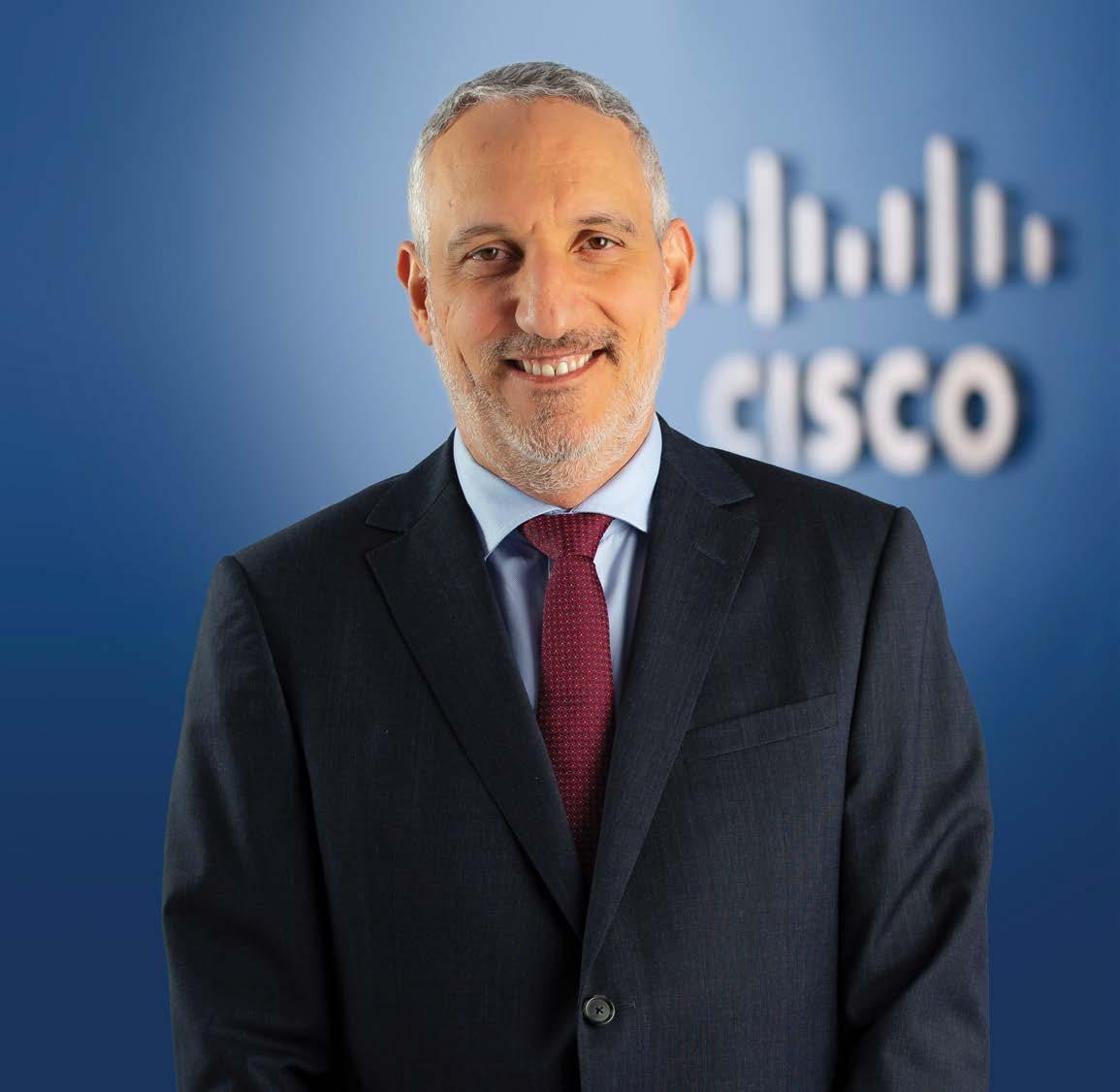
ethical AI and the need for responsible AI frameworks and regulations – and our conversation pivoted towards that talking point.
“The ethical use of AI is absolutely critical, and this is something that we emphasise greatly at Cisco, through the responsible AI
framework, which we helped define. It is incumbent on us to ensure that AI technologies are deployed securely and transparently in order to build trust and to mitigate risks. Now as I mentioned earlier in the conversation, cyber criminals are leveraging AI in their attacks, so with them
doing that, we as a leader on the defense side have to counter-attack that because the organisations cannot rely on human scale defense - and that's why Cisco has embedded AI in cybersecurity defense to assist, automate, and augment the capabilities of the SecOps team,” said Younes.
He added that Cisco has introduced AI assistance across its entire security portfolio – and highlighted the role played by its Cisco AI Defense product that was launched in January 2025.
“We are introducing AI assistants all across our product and solution stack, and we are empowering the SecOps team by providing them actionable insights through AI to automate their complex workflows, which reducing the time required for incident response. And this will ensure that even less experienced analysts, and we know the scarcity of those, can effectively manage all these AI-driven threats. Our latest innovation, the Cisco AI Defense, is actually purpose built for enterprises to develop, deploy, and secure the AI applications with confidence. It is an end-toend solution that protects both the development and the use of AI applications, so that enterprise can advance their AI initiatives with confidence, because the last thing we want to do is slow down that AI adoption. However, at the same time, we cannot let them go with all the risks that are associated. In summary, we're safeguarding against the misuse of AI tools, data leakage, and increasingly sophisticated threats, which existing security solutions quite frankly, are clearly not equipped to handle,” said Younes.
One of the most glaring findings from Cisco’s Cybersecurity Readiness Index was the talent gap that exists, not only in the UAE, but worldwide.
It isn’t a problem that is going to be fixed overnight, but Younes conceded it is a major challenge.
“The talent gap in cybersecurity isn't something new, and it is a very real problem, and it's not something that is going to go away overnight. On the contrary, it is actually increasing, but it’s not just an issue specific to the UAE, it’s a global problem. To put the challenge into perspective, there are around 4 million cybersecurity professionals needed urgently to plug the talent gap, so that’s gives you an indication on the scale of the problem at hand,” said Younes.
87% of those surveyed in the Cisco Cybersecurity Readiness Index identified the shortage of skilled cybersecurity professionals as a major headache for their organisation.
Younes outlined that it wasn’t just Cisco’s customers feeling the pinch, and that their entire ecosystem of partners and system integrators are dealing with the same issue.
Younes said that in the long-term their Networking Academy will continue to upskill and train millions of people, but in the short term they are focused on leveraging their technologies to support overstretched SecOps teams.
“In the long term the Cisco Networking Academy will
train and upskills millions of cybersecurity professionals across the Middle East and Africa region, but more immediately, we're using technology to reduce the pressure on already stretched SecOps teams. As I referred to earlier, Cisco is embedding AI across our entire cyber security portfolio with AI systems, and the objective of that is to simplify the ops team and reducing their work cycles. Most recently at the RSA conference last month, we announced a new innovation around our Cisco XDR offering, which is the extended detection and response solution that is now leveraging Agentic AI, to handle many of the timeconsuming repetitive tasks and that used to require deep expertise,” said Younes.
Younes highlighted how their attack storyboard, a visual representation of a cyberattack within their Cisco XDR, or Cisco SecureX platforms was saving SecOps teams weeks in terms of generating reports.
Features like, instant attack verification, automated forensics, and attack storyboard.
“The attack storyboard is very interesting because it demonstrates what exactly happened in chronological order after a cyberattack has occurred in a matter of
While AI brings the promise of new possibilities and boosts organisations' innovation and competitiveness, it also adds layers of complexity and risks to an already complicated security landscape.”
seconds. They can generate a very detailed report that could have taken the SecOps team weeks to generate Yeah. Ultimately, this will help analysts regardless of their experience level to move quickly from alert to action with confidence, and that not only improves efficiency, but it makes security operations much more accessible. So, while we can continue to close the skills gaps through the networking academy, we can also help address the issue now through our XDR and SecureX platforms,” said Younes.
The pendulum of the conversation swung back towards the Cisco Cybersecurity Readiness Index.
A comprehensive survey, now in its 3rd year, consisting of 8,000 businesses across 30 global markets.
As Younes explained the index accesses the deployment and maturity of cybersecurity solutions across these global markets.
The survey is broken down into four categories of readiness, which are beginner, formative, progressive and mature.
In terms of the UAE, 30% of organisations have reached a progressive or mature state.
Younes believes that is a healthy figure, but stressed that those numbers are not likely to increase hugely, due to the volatile and dynamic nature of the cybersecurity industry.
“The study measures security readiness against the following key pillars that are critical for securing the modern organisations against evolving cyber threats. The five pillars
are identity intelligence, machine trustworthiness, network resilience, cloud reinforcement, and AI fortification. Last year, if we compare the results, and I'm not talking just about the UAE only, but globally. If you compare the results in terms of maturity this year versus last year, then you will see that at the same time, they're investing ad they're consolidating. They're doing the right things, but at the same time, it's not progressing rapidly. You’re not going to jump by 10%. Because whist organisations are investing in those new technologies, there are new threats popping up all the time. And this year, in particular, with AI coming into the picture it has made the picture even blurrier,” said Younes.
Younes explained the newest pillar of the Index is the AI fortification layer.
“The AI fortification pillar wasn't there a few years ago, and that's now the fifth pillar. I’ll go through each pillar quickly. The identity security framework prioritises identity visibility, adopts a zero trust architecture, and utilises password-less, or multifactor authentication bolstered by AI-driven detections. The second pillar is machine trustworthiness, but it's also promoting the concept of a zero-trust model. And this is where we need to have that model deployed, to diligently verify all users, but also devices. So, the posture of your device, not only your identity is critical,
before granting access to networks, and serving as a critical mechanism for ensuring trusted access. The third one is network resilience, and organisations are actually recommended to urgently enhance their network resilience, advancing beyond partial security, implementations to adequately prepare for the challenges posed by the AI era,” said Younes.
Younes stressed the importance of correlating what is happening across all your domains rather than adopting a siloed approach to cybersecurity. He concluded a brilliant conversation, by touching on the importance of unified cloud security.
“The fourth pillar is unified cloud security, and this is transitioning from the fragmented, to cohesive security strategies that are proactive and AI enhanced, allowing for more efficient management of security across cloud environment. So, this is all about giving the security teams more visibility and control, across the multi-cloud environment, wherever the workloads applications are. The objective has to be the production of a consistent policy across all workloads, regardless of where they reside, be it AWS, or Azure. Finally, the last one is the AI security strategy, and this is about developing a comprehensive security approach that focuses on and secures both the deployment of AI technologies and the underlying models, ensuring reliability and integrity,” said Younes.

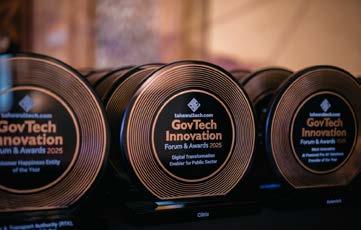
CPI Media Group and tahawultech.com hosted their annual GovTech Awards , which recognises excellence from IT leaders in the

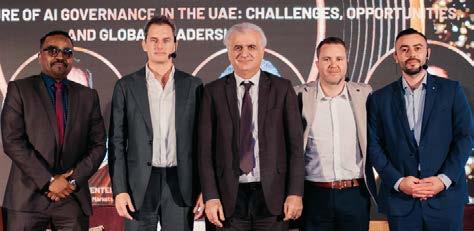
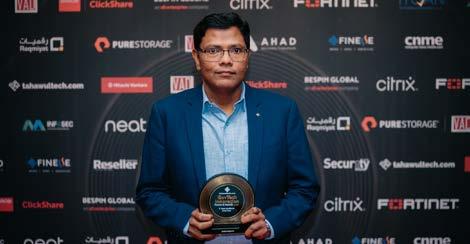



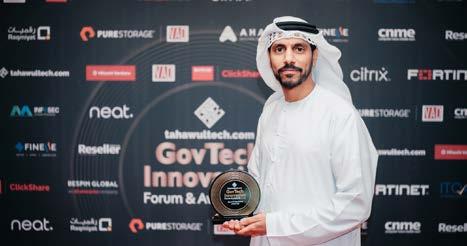

Dr. Majeda Mohamed Al Marzooqi, EDGE Group PJSC
Government IT Leader of the Year

Dubai Electricity & Water Authority (DEWA)
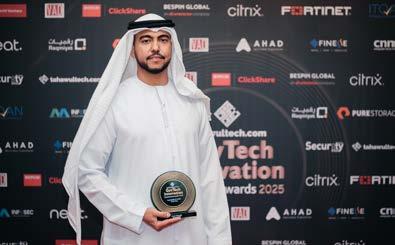
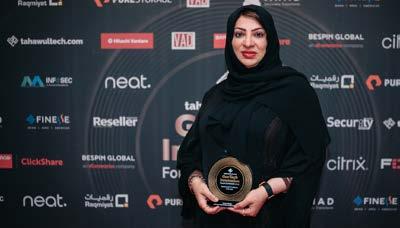
Zainab AlNajjar, Al Kuwait Hospital Dubai, Emirates Health Services
Government IT Trailblazer of the Year
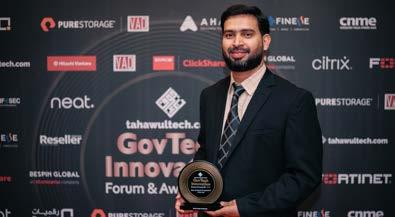
Government Pioneer of the Year Citrix
Farah Alsheraifi, Daman Health
Sustainable IT Leader of the Year
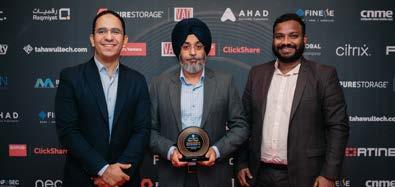
Seclore
Data-Centric Security Leader of the Year
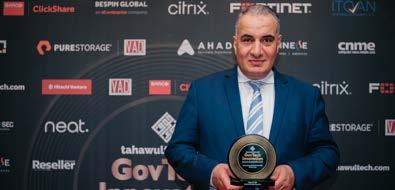
Feras Al Jabi, ITQAN Al Khaleej Computers
Technology Business Leader of the Year

Smart Umm Al Quwain Umm Al Quwain IT Department of the Year

Digital Transformation Enabler for Public Sector
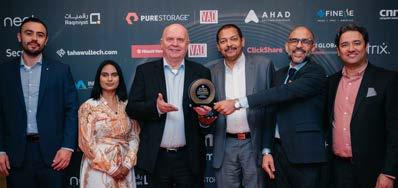
Hitachi Vantara Excellence in AI-Ready Infrastructure

Raqmiyat
Best AI Analytics Solution Provider of the Year

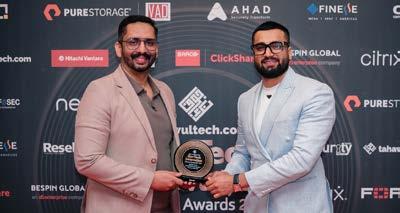
Avientek
Most Innovative AI Powered Pro AV Solutions Provider of the Year

Telecommunications and Digital Government Regulatory Authority (TDRA)
Digital Transformation Project of the Year
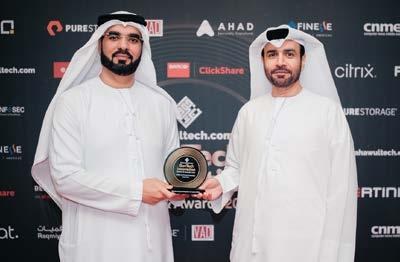
Emirates Integrated Registries Company (EIRC)
Public and Private Partnership of the Year
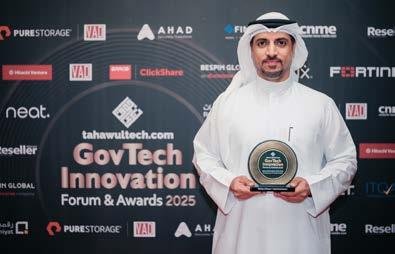
Ministry of Finance – United Arab Emirates
Best AI Innovation of the Year for Business Transformation
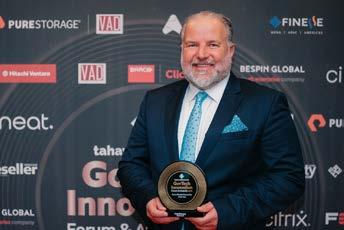
Fady Richmany, Commvault Record Breaker Personality of the Year
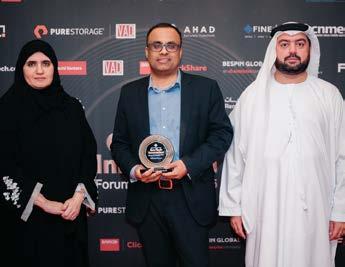
Ministry of Health and Prevention (MoHAP)
Mobile App of the Year
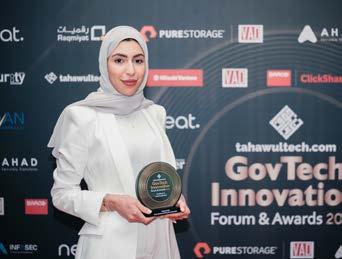
Rayan Awad, Ports, Customs and Free Zone Corporation Excellence in Talent Leadership
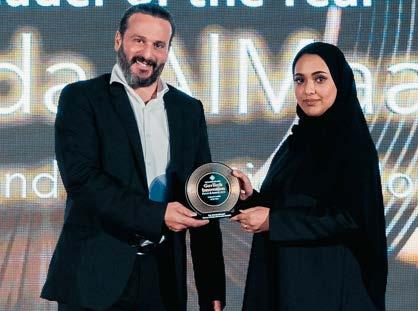
Eng. Hamda AlMaazmi, Ministry of Health and Prevention (MoHAP) Future IT Leader of the Year

Dubai Air Navigation Services (dans)
Dubai IT Department of the Year

Abdalla Al Ali, Dubai Multi Commodities Centre Authority (DMCC) Government IT Leader of the Year
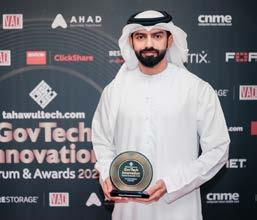
Ministry of Community Empowerment Innovative Initiative of the Year
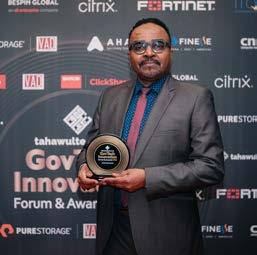
Anas Elsadig Eltahir Government Innovation Leader of the Year
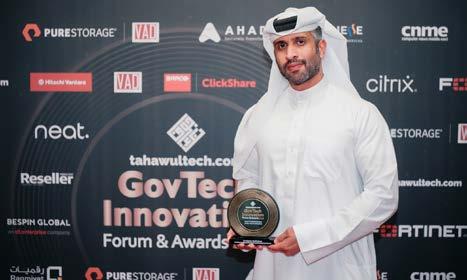
His Highness Shaikh Nasser Artificial Intelligence Research and Development Centre
Best AI Implementation of the Year in Education

Dubai Culture & Arts Authority, Government of Dubai
Best AI Governance Framework of the Year
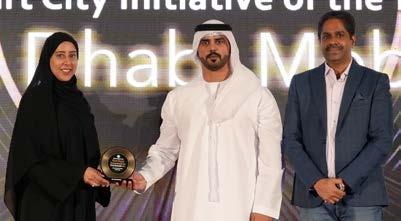
Abu Dhabi Mobility
Smart City Initiative of the Year
Dubai Police AI Implementation of the Year
Public Services Department, Government of Ras Al Khaimah
Ras Al Khaimah IT Department of the Year
Roads & Transport Authority (RTA), Government of Dubai
Customer Happiness Entity of the Year
Her Excellency Dr. Mubaraka Ibrahim, Emirates Health Services
Woman in Government of the Year
Dubai Digital Authority, Government of Dubai
Best Customer Experience in the UAE Government
Aisha Awadh Alhemeiri, Department of Community Development, Government of Abu Dhabi
Pioneer Woman of the Year in Government Leadership

Abu Dhabi Judicial Department Cybersecurity Implementation of the Year
National Center of Meteorology and Seismology
Best Use of Technology
Public Prosecution, Government of Dubai
Cybersecurity Solution of the Year
Jinson Pappachan, Emirates Policy Center Knowledge and Innovation Leader of the Year
Sharjah Airport
Sharjah IT Department of the Year
Dubai Silicon Oasis (DSO) Knowledge and Innovation Excellence Award
Alexander Honigmann, Director, Transportation and Logistics, EMEA at Zebra Technologies, has penned an exclusive op-ed for June’s edition of CNME, in which he examines how the implementation and widespread adoption of AI is completely revolutionising the warehousing intralogistics.
The value of the global market for Artificial Intelligence (AI) in warehousing is projected to grow by almost a quarter by 2030, reaching around €39 billion.
At the same time, warehouse businesses are saying that their most pressing challenges are developing smarter strategies around optimisation and automation and achieving a timely return on investment (ROI).
The ongoing difficulty of finding enough skilled workers also means more operations turning to technology for help to maintain productivity. So it’s no wonder that 60% of warehouse leaders in Europe say they plan to implement AI within five years.
Cost savings is one of the key motivators behind that intention. Logistics research by McKinsey suggests that “thanks to forecasting with AI, it is possible to reduce supply chain errors to 20-50%. At the same time, warehouse and administration costs can be decreased by 5% to 10% and 25% to 40%, respectively.”
Savings of time and space are also key reasons why AI

is sought out by warehouse leaders. One senior leader of operations at a global logistics company says that AI is delivering lots of small time and space savings which quickly add up to big cost savings for the company.
And with on-device generative AI (GenAI) assistants on mobile
computers and tablets, workers no longer need to leave the warehouse floor to consult a desk-based warehouse management system (WMS), as operating procedures, inventory data and task lists can be accessed quickly with the help of the AI assistant.
And it’s on the warehouse floor that the everyday improvements delivered by AI add up to big gains for logistics operations. They’re also a more connected frontline workforce, with unified synchronised software designed to seamlessly connect workers with other.
As well as the need to save space in existing premises, the challenge of managing the increasing average size of warehouses is also driving the shift to AI and predictive analytics.
Worldwide the average warehouse size is now
60% of warehouse leaders in Europe say they plan to implement AI within five years.”

estimated to be over 100,00 square metres, and total global volume is projected to increase by 27%, from 3.06 billion square metres in 2023 to 3.9 billion square metres in 2030.
The vast size of modern warehouses is matched by the vast amount of data generated from warehouse activities, which is simply too great for manual analysis alone.
The processing power and level of insight provided by AI-driven analytics tools and intelligent automation allows decision-makers and frontline workers to gain greater visibility into assets and inventory and respond proactively to potential inefficiencies and bottlenecks. AI-driven benefits can start
long before the goods arrive at the loading area to be dispatched. The integration of AI into machine vision and fixed industrial scanning solutions enables inspection, sortation, and tracking workflows including the imaging of unstructured goods, such as a pallet or conveyor belt of items of different sizes and shapes. For example, implementing a scan tunnel solution for one of the world’s largest global transportation and logistics enterprises resulted in improved read rate accuracy by 37%, decreased downtime and manual handling by 29%, and reduced operational costs by 13%.
Then consider a team of warehouse workers tasked with loading delivery trucks. They must ensure that each truck is optimally filled,
considering the weight, size, and destination of each parcel. Mobile dimensioning applications with AI algorithms can accurately measure box and package dimensions, significantly reducing manual errors and speeding up processing times.
And AI-driven software on a tablet can visually represent the best way to load the truck for balance and efficiency.
The AI could analyse each parcel’s data and destination and suggests the order and position for loading.
This ensures that the truck is securely packed and unloading at each stop is streamlined. It also reduces the risk of injury caused by manual handling - not a small concern, given that 73% of warehouse associates in Europe are concerned about injuries on the warehouse floor.
But AI doesn’t stop working its magic once the goods are on the truck and ready to go. By leveraging advanced algorithms and real-time data analysis, AI systems can calculate the most efficient paths for moving goods, based on a multitude of variables such as equipment availability, storage conditions, order priorities, and workforce distribution.
The bottom line is that over eight in 10 decision-makers and associates agree that the increased use of technology and automation helps boost frontline productivity. AI in warehouse intralogistics will continue to play an increasingly large role in that picture over the next five years and more.
Bespin Global
Bespin Global , an e& enterprise company outlined in detail how their agile product portfolio is designed to help public sector enterprise navigate and circumvent issues they face when migrating to public sovereign cloud models, during an exclusive roundtable held at the Ritz-Carlton JBR.

The roundtable was held in conjunction with CPI Media Group, and was moderated by CNME Editor Mark Forker.
The topic of the roundtable was entitled, Next-Gen Governance: Powering the Future of Digital Government with Cloud.
The series of presentations were delivered by the executive leadership from Bespin Global, which included; Mouteih Chaghlil, CEO of Bespin Global, Bassam Abbasi, Head of
Network & Security, at Bespin Global and Sami Wahab, VPSales at Bespin Global.
The roundtable was attended by IT leaders from the following public sector organisations.
Abu Dhabi Mobility
• Sharjah Muncipality
• Smart Umm Al Quwain
Dubai Multi Commodities
Centre Authority (DMCC)
• Dubai Legal Department
EDGE Group
• Al Kuwait Hospital Dubai
• Dubai Culture & Arts
• Ministry of Finance
• Dubai Air Navigation Services
The first session of the roundtable was delivered by Bespin Global CEO, Mouteih Chaghlil, who laid out how the company wants to be the partner of choice for public sector entities looking to accelerate their migration to the cloud.

"We know there are many challenges, and data classification is certainly a big one. What sort of data do I have, what is it, where is it, where does it need to reside, this sort of data classification needs to be determined, but it's not always black and white, and AI is only as good as the data you have. However, what we do know is that 32% of public sector entities in the UAE, KSA and Egypt are already utilising cloud-based customer engagement solutions, and 40% of them are planning to adopt cloud in the next few years. The opportunity is huge, and we know we have the capabilities to build secure and compliant hybrid/ multi-cloud environments that support sovereignty and resilience," said Chaghlil.
There was a huge level of engagement and interaction between Chaghlil and those in attendance, with some outlining their desire to remain with SaaS cloud models.
Chaghlil then highlighted how public services digitised with


cloud and AI can really deliver localised innovation at scale.
"Our cloud-native solutions are tailored to national priorities and governance models. Our AI models trained on localised data ensure cultural and legal alignment. Integration with legacy systems enables a smooth transition without disruption and scalable infrastructure enables a rapid deployment of new services. In addition to this, having real-time access to unified data across agencies improves responsiveness and collaboration," said Chaghlil.
The next presentation was delivered by Bassam Abbasi, Head of Network & Security, at Bespin Global, and he stressed the importance of building a secure hybrid/multi cloud strategy in order to to ensure smooth migrations for
mission-critical systems.
There was a sharp focus on the role of AI in relation to cybersecurity, and how it builds that resilience and transparency that governments require.
Abbasi insisted that people will remain at the core of digital transformation.
"Trust, transparency and control are critical, they are non-negotiable, and we get that. We can implement sovereign cloud models to protect sensitive citizen data, whilst maintaining that transparency on the data in line with clear governance rules and policies. We offer opt-in features and selfservice options that ultimately empower users. At the end of the day, that is our goal, we want to take people with us in a way in which they maintain
32% of public sector entities in the UAE, KSA and Egypt are already utilising cloud-based customer engagement solutions, and 40% of them are planning to adopt cloud in the next few years.”

autonomy on the direction, but also have agility with accountability," said Abbasi.
Abbasi also highlighted how the landscape will change dramatically over the next few years.
"Within the next 1-3 years the picture is going to look a lot different due to the fact that public sector enterprises are going to pivot to either hybrid multi-cloud (33%), multiple public clouds (31%) or hybrid cloud (23%), with only 7% planning to remain solely in a datacentre, or private cloud. This change is driven by the need to modernise infrastructure to meet increasing demand for digital citizen services, improve the citizen experience, strengthen data security, and harness the power of emerging technologies. In addition, IT leaders are motivated to modernise their IT
environment to prepare for future crises," said Abbasi.
The final presentation of the roundtable was delivered by Sami Wahab, VP - Sales at Bespin Global.
His presentation examined the elements that come beyond migrations, and was focused on how Bespin can unlock innovation and increase efficiency in the public sector.
He highlighted how Bespin Global's products can 'modernise workforces' across the public sector.
"We know we have the capability to boost productivity and enhance collaboration with our state-of-the-art modern workforce solutions with a
secure framework that ensures seamless connectivity and data protection, and it is ultimately designed to transform the way you work. In summary, we design, develop and implement bespoke cloud solutions that specifically cater to your unique business needs," said Wahab.
Wahab concluded a brilliant presentation by giving attendees some predictions that Bespin Global envisage will come to fruition over the next few years.
"In terms of the multicloud, by 2027, 40% of enterprises will rely on interwoven IT architectures across cloud, core, and edge to support dynamic, location-agnostic workflow priorities. When it comes to GenAI on the cloud, by the end of this year, 70% of enterprises will form strategic ties to cloud providers for GenAI platforms, developer tools, and infrastructure, requiring new corporate controls for data and cost governanceand in terms of cloud data mobility, over the next 12 months, 55% of the G2000 will adopt multi cloud data logistic platforms to enable active data migration between hyperscalers to optimise costs, reduce vendor dependencies, and improve governance," said Wahab.
We know we have the capability to boost productivity and enhance collaboration with our state-of-the-art modern workforce solutions with a secure framework that ensures seamless connectivity and data protection.”
MiCloud Software
CNME Editor Mark Forker sat down with Pierpaolo Taliento, CEO of MiCloud Software, to learn more about how the company’s technologies are reimagining workflows, the principles that are guiding their approach to building digital workspaces of the future, the challenges that remain in our work from anywhere world – and how MiCloud are leveraging the power of AI and infusing it into their product portfolio.
How does MiCloud Software envision the future of work, and what role do you see your company playing in that transformation?
As the exclusive representative of Cloud Software Group (CSG) in EEMEA, our role goes beyond delivering technology — we act as architects of secure, intelligent, humancentric workspaces for a region as diverse as Eastern Europe, the Middle East, and Africa.
We see the future of work not as a place, nor a set of tools, but as a living ecosystem that flexes around people, business needs, and the intelligence surrounding them.
We are moving away from the outdated concept of “workspace as a product.” In our vision, workspaces are borderless, adapting naturally to people’s lives. AI becomes a silent co-pilot that enhances

human judgment and anticipates needs. Security transforms from a constraint into a catalyst for freedom and trust.
We’re not here to digitize old workflows – we are here to engineer environments where work flows with life. That’s the future — and that’s MiCloud’s mission in EEMEA.
What leadership principles guide MiCloud’s approach to building digital workspaces that are adaptive, resilient, and human-centric?
First, we embrace systems thinking over rigid control. In a connected world, leadership means creating conditions where autonomy thrives and people can operate at their best — without micromanagement or artificial barriers.
Second, we design for the invisible. The most powerful technologies are those you don’t notice because they fit so seamlessly into your workflow that they simply

disappear. We aim to make our solutions as intuitive and frictionless as possible.
Third, we measure success by human impact, not just business metrics. A resilient workspace isn’t just technically robust — it’s emotionally sustainable. It fosters connection, supports creativity, and gives people a sense of purpose and belonging.
How has your strategy shifted post-pandemic to support remote, hybrid, and globally distributed teams more effectively?
The pandemic didn’t just redefine where people work — it redefined how trust, collaboration, and value are created. Before 2020, digital tools
were about process efficiency. Today, our strategy focuses on building connected ecosystems that make distributed work feel natural, fluid, and deeply human.
We deliver Citrix and TIBCO software solutions that enable secure, high-performance digital workspaces and seamless data integration. We don’t just sell licenses — we empower our partner ecosystem to deliver services, customisation, and local support, ensuring our customers can scale, adapt, and succeed across diverse markets.
Our shift has been from providing software platforms to enabling environments where people, AI, and systems collaborate in real time — with Citrix powering secure, flexible access and TIBCO driving intelligent data integration and insights.
This isn’t just a shift from office to remote. It’s a shift from control to connection — with Citrix and TIBCO at the heart, and our partners amplifying the value on the ground.
“We see the future of work not as a place, nor a set of tools, but as a living ecosystem that flexes around people, business needs, and the intelligence surrounding them.”
What are the biggest challenges companies face when adopting flexible work policies, and how can technology help overcome them?
The real challenge with flexible work isn’t technology — it’s human nature.
Companies fear losing control, employees fear losing connection, and leaders fear losing visibility. The result is

often a patchwork of policies, tools, and compromises that please no one and frustrate everyone.
In EEMEA, where cultures, infrastructures, and regulations vary widely, this tension is even sharper. Flexibility without clarity breeds confusion. Freedom without trust breeds chaos.
That’s where technology becomes more than a tool — it becomes the backbone of a new social contract between employers and employees.
With Citrix, we provide digital workspaces that guarantee secure, seamless access, no matter where or how people work. With TIBCO, we help organisations integrate and visualise data across distributed
environments, so decisions stay informed and connected.
But most importantly, we believe technology should guide flow — not enforce control. The future of flexible work depends on systems that empower autonomy, foster transparency, and make trust the default setting.
How is MiCloud Software integrating AI into its products or services to enhance productivity and employee experience?
We don’t believe in AI for the sake of AI. We believe in AI that makes work more human. Through Citrix, AI helps create adaptive workspaces — predicting user needs, streamlining access, and reducing digital noise. It’s the silent assistant that removes friction: fewer logins, smarter resource allocation, and a personalised experience that feels natural, not intrusive.
With TIBCO, AI transforms data into decisions. It empowers organisations to visualise complex data, detect patterns, and automate insights — helping leaders make smarter choices in real time.
But for us, AI isn’t a product feature. It’s a philosophy. We see it as a co-pilot that relieves people from the dull, the repetitive, and the overwhelming — so they can focus on creativity, connection, and leadership.
What are your thoughts on the ethical use of AI in workplace settings, especially concerning employee monitoring and decision-making?
We believe AI in the workplace should follow one golden rule: If it wouldn’t be acceptable in a human relationship, it shouldn’t be acceptable in a digital one.
AI should never be used as a surveillance tool. Monitoring behavior to control people erodes trust, stifles creativity, and breaks the very human connection that flexible work relies on.
Instead, AI should act as a guide — highlighting patterns, offering insights, and supporting better decisions. With Citrix, this means enabling proactive security and seamless user experiences without ever crossing into invasive oversight. With TIBCO, it means empowering datadriven leadership that’s transparent, explainable, and always accountable.
We see AI as a mirror, not a magnifying glass. It should reflect opportunities, not expose weaknesses.
Our commitment is simple: We build technology that protects human dignity first — and serves business goals second. That’s not just ethics. That’s long-term business sense.
We believe AI in the workplace should follow one golden rule: If it wouldn’t be acceptable in a human relationship, it shouldn’t be acceptable in a digital one.”
Hitachi Vantara, a global leader in data infrastructure hosted an exclusive roundtable entitled ‘Lead with Intelligence, compete with data and win with trust’ in Riyadh on May 22nd.
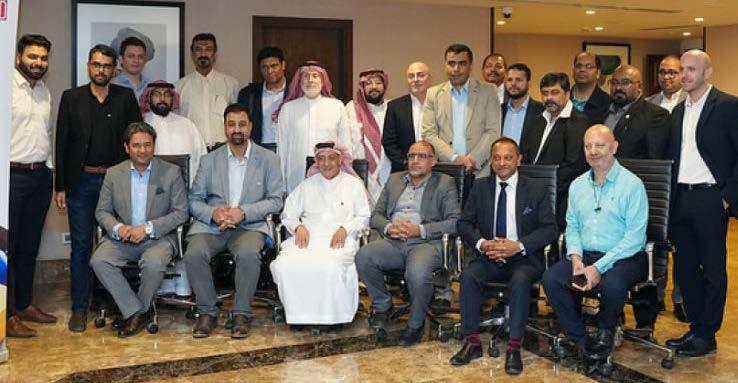
The event brought together industry leaders and technology experts to explore evolving trends in AI infrastructure, hybrid cloud strategies, cyber resilience, and ethical AI. Moderated by Rehan Shahid, Regional Channel & Alliances Manager – Middle East & Pakistan at Hitachi Vantara, the session facilitated open dialogue among participants from public and private sector entities including ministries, financial services, and multinational organisations. The roundtable session had participants that contained IT
personnel from the Ministry of Finance, a number of prominent Saudi holding companies, and entities operating in the FinTech and consulting space across the Kingdom.
Key Highlights:
1. Defining Cyber Resilience
The session began with a discussion on cyber resilience versus cybersecurity. Rehan
emphasised that resilience is the ability of an organisation to recover from disruptions such as ransomware attacks— resuming operations swiftly post-incident.
“Cybersecurity is about prevention, while cyber resilience ensures recovery”, said Rehan.
The group acknowledged regulatory frameworks such as the EU’s DORA (Digital Operational Resilience Act) and similar emerging standards in the Middle East.
2. Hybrid and Multi-Cloud Strategies
The discussion highlighted the shift from a public-cloudonly narrative to hybrid cloud adoption. According to Rehan, only 17-18% of workloads reside on public cloud, while the majority are managed through hybrid or private cloud setups. This was echoed
No large language model is bias-free. Transparency and trust must be built into AI models, especially in regulated industries”.

by the Ministry of Finance, which is actively transitioning to certified cloud providers under regulatory supervision.
3. AI Readiness and Data Strategy
Participants agreed that AI is a key driver of enterprise transformation. However, its
success depends heavily on data quality and readiness.
A fintech CTO shared concerns about over-reliance on AI: “AI is powerful, but it’s not universally applicable. Data integrity and contextual ROI are critical”.
Rehan emphasised that AI must be validated with
clean, structured data to avoid “garbage-in, garbage-out” outcomes. He introduced the concept of “agentic AI”—AI capable of making autonomous decisions— and noted that Hitachi has already implemented such use cases internally.
4. AI Investment Across the Middle East
The region is witnessing unprecedented AI investment. Examples included:
• Saudi Arabia’s $5B AI data centre project in NEOM.
• UAE’s goal of becoming the first AI-native government by 2027.
• Abu Dhabi’s $500M Stargate Project and planned €50B investment in AI data infrastructure in France.
Al Patel, Head Of Distribution Sales & Technical Alliances EMEA And Channel Sales Director MEA, Hitachi Vantara, noted, “Analysts predicted $15B in UAE AI investment by 2026. But we’re already there. The market is outpacing predictions”.
5. Ethical AI and Governance
The session explored challenges around fairness, accountability, and privacy in enterprise AI.
“No large language model is bias-free”, Rehan explained. “Transparency and trust must be built into AI models, especially in regulated industries”.
6. AI Infrastructure Needs
Hitachi shared insights from a survey of 800 global enterprise customers, including BMW, Citibank, and NASA. Key findings:
• Top priorities: Reliability, flexibility, and scalability.
• Deployment preference: 78% prefer onpremises infrastructure for performance and control.
• Technology Shift: GPUs are becoming core to AI workloads; Hitachi predicts CPUs may diminish in relevance in the next decade.
7. Introducing Hitachi IQ
Hitachi Vantara unveiled its AI platform, Hitachi IQ, which integrates:
• High-performance storage and compute infrastructure.
• Advanced file systems optimised for AI workloads.
• A modular, scalable architecture in partnership with NVIDIA and Hitachi Limited.
The AI Discovery Service was also launched to help organisations define, validate, and prototype AI use cases across three phases— Discovery Sprint, Advisory Service, and Jumpstart Proof of Concept (POC).
8. Use Case Development & Data Sovereignty
Participants raised concerns about intellectual property and regulatory compliance, especially regarding POC deployments involving sensitive data. Hitachi assured that IP rights remain with customers and emphasised the importance of data residency in solutions offered in-region.
9. Sustainability and Energy Efficiency
As AI data centres consume increasing energy, sustainability was a pressing concern.
“An AI-powered data centre can consume more
electricity than an entire city”, Rehan noted.
Hitachi’s VSP (Virtual Storage Platform) was presented as the industry’s most energy-efficient system, with four of the top five Energy Star ratings globally. Their upcoming VSP 360 aims to unify data storage management across SAN, NAS, object, and cloud environments.
10. Closing Remarks: Future of Agentic AI
The roundtable concluded with a look toward the future. Agentic AI— capable of autonomous decision-making—is set to redefine enterprise roles, transforming IT departments into stewards of digital agents.
“Soon, IT will function like HR—provisioning, nurturing, and managing AI agents” , Rehan predicted.
The session reaffirmed Hitachi Vantara’s commitment to enabling data-driven innovation through trusted infrastructure, ethical AI solutions, and industryspecific expertise. As AI adoption accelerates in the region, organisations must strike a balance between innovation, operational readiness, and sustainable growth.
For further engagement, participants were invited to collaborate with Hitachi’s local teams or explore proof-ofconcept labs available in the Netherlands and the Middle East.


Surface Pro and Surface Laptop deliver the best of AI across devices and the cloud to drive productivity, creativity, innovation, and resilience. To ensure a seamless experience, we built and tested Copilotand Copilot for Microsoft 365 on Surface devices
Pioneering versatility matched by intelligent power
Unlock high performance in a form factor that redefines what a laptop can do.




The HD front-facing Surface Studio Camera supports powerful Windows Studio Effects



Employees interact with Copilot effortlessly through touch gestures or inking with Surface Slim Penon the PixelSense Flow touchscreen

The new Copilot key provides access to Copilot.
On-device AI finds almost anything fast with Recall and empowers collaboration through real-time translation of 40+ languages to English using Live Captions.


Snapdragon®X Elite and Plus processors unlock new levels of speed and efficiency with an industry-leading NPU that drives up to 45 TOPS for seamless on-device AI.

Transformative design packed with intelligent power
Embrace opportunity with Copilot+ PC performance in a newly sleek profile with a smaller footprint and larger screen real estate



